TPO听力话题分类
托福听力改革和题型介绍

刚刚在上周末结束的托福考试中,听力成功霸占了热搜。
很多考生都反映听力太难了,本身想靠听力carry总分,结果先栽倒在听力上了。
对于打算考托福和备战托福的考生来说,听力轻松拿高分的日子已经一去不返。
托福听力改革即将在8月份实施的托福新政里,听力的题目得到了精简。
取消了一个lecture的部分,由原先的4段讲座(加试6段)变为3段(加试4段),每个部分的题目数量不变。
但是时间由原来的60分钟,遇到加试90分钟,下调至41分钟,遇到加试57分钟。
原本1段讲座平均有10分钟的答题时间,时间却减少了整整将近20分钟。
答题时间变得紧凑,每道题目分值增加,这就无形中增加了听力难度。
在最新版的TPO样题中,我们可以一瞥改革后的听力题型。
正如改革的政策提到的,删减了一道讲座题,总题目数将至28道,平均托福听力每道做题时间由1.76分钟变为1.4分钟。
托福听力话题类型托福听力部分包2个对话(conversation)和4段演讲(包括教室对话在内的lecture)。
每个对话涉及2个或2个以上的说话者,每个对话是2至3分钟,每个对话对应5道试题。
对话都是大学校园中的非学术类场景,首个场景出现在学校办公室里。
对话也许会牵涉学术内容又或是和课程要求有关。
第二个场景介绍人有关学生服务的对话。
每段演讲对应6道试题。
每个演讲是4至6分钟。
讲座通常都是来源在老师的课堂授课。
讲座也许是从教授的讲课内容,或者是学生的提问,还或者是师向学生提问并且请一位学生回答里摘录的。
托福听力题目类型新托福听力里的大多数题目,不论是对话还是讲座,全部是用传统的四选一的选择题为主。
根据《The Official Guide To The New TOEFL》即托福考试官方指南(OG)的介绍,新托福考试听力部分有八种题型,可分为以下三类:1.内容主旨题理解讲座或对话的主旨大意,或者对话目的。
常见的提问方式有以下几种:What is the main idea of this lecture?What are the two speakers talking about?Why does the student go to see his professor?2.判断题是非判断题也是托福考试改革后出现的较为新颖的题型,一般是列出很多与录音材料中所提及的内容较为相似的句子,让考生辨別究竟哪些是录音材料中提到的。
tpo63听力解析
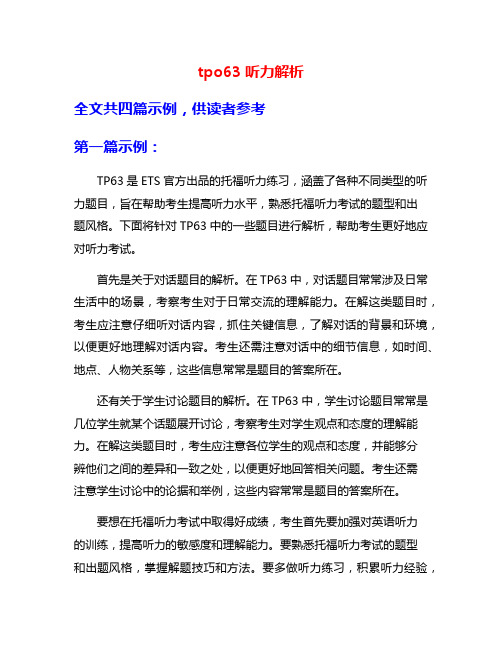
tpo63听力解析全文共四篇示例,供读者参考第一篇示例:TP63是ETS官方出品的托福听力练习,涵盖了各种不同类型的听力题目,旨在帮助考生提高听力水平,熟悉托福听力考试的题型和出题风格。
下面将针对TP63中的一些题目进行解析,帮助考生更好地应对听力考试。
首先是关于对话题目的解析。
在TP63中,对话题目常常涉及日常生活中的场景,考察考生对于日常交流的理解能力。
在解这类题目时,考生应注意仔细听对话内容,抓住关键信息,了解对话的背景和环境,以便更好地理解对话内容。
考生还需注意对话中的细节信息,如时间、地点、人物关系等,这些信息常常是题目的答案所在。
还有关于学生讨论题目的解析。
在TP63中,学生讨论题目常常是几位学生就某个话题展开讨论,考察考生对学生观点和态度的理解能力。
在解这类题目时,考生应注意各位学生的观点和态度,并能够分辨他们之间的差异和一致之处,以便更好地回答相关问题。
考生还需注意学生讨论中的论据和举例,这些内容常常是题目的答案所在。
要想在托福听力考试中取得好成绩,考生首先要加强对英语听力的训练,提高听力的敏感度和理解能力。
要熟悉托福听力考试的题型和出题风格,掌握解题技巧和方法。
要多做听力练习,积累听力经验,提高应对考试的能力。
希望考生们能够通过努力提高听力水平,取得理想的托福成绩。
【以上内容为托福考试解析,仅供参考】。
第二篇示例:托福听力考试是托福考试中的一个重要部分,听力部分共分为短对话和长对话两个部分,考察考生在不同情境下的听力能力和理解能力。
TPO63是托福官方的一套听力模拟题,对于备考托福考试的考生来说是一个非常重要的练习资源。
TPO63听力部分分为四篇长对话和五篇短对话,整体难度适中,涵盖了各种场景和话题,包括学术类话题、学生生活、社交场合、教育等。
下面我将就TPO63的听力部分进行详细解析,希望对备考托福听力的考生有所帮助。
1. 长对话1该长对话主要讨论了两位学生关于选修课程的讨论。
TPO听力分类总结

Art TPO1TPO3TPO3TPO4TPO5TPO6艺术Lecture1Lecture2Lecture3 Lecture2Lecture4Lecture3TPO16TPO16TPO17Lecture2Lecture4Lecture1Anthropology TPO1TPO7TPO9TPO14人类学Lecture3Lecture3Lecture4Lecture4Psychology TPO2TPO10TPO14TPO15心理学Lecture1Lecture4Lecture1Lecture1Philosophy TPO2哲学Lecture3Biology TPO1TPO2TPO4TPO6TPO7TPO8生物学Lecture4Lecture2Lecture1Lecture2Lecture2Lecture1TPO17Lecture4Astronomy TPO2TPO3TPO5TPO13TPO14天文学Lecture4Lecture4Lecture2Lecture4Lecture3Geology TPO1TPO3TPO6TPO7TPO9TPO15地质学Lecture2Lecture3Lecture4Lecture4Lecture3Lecture2Environmental TPO3TPO9TPO10TPO11TPO12TPO13环境科学Lecture1Lecture2Lecture3 Lecture3Lecture4Lecture2Business TPO6TPO11TPO12商业Lecture1Lecture4Lecture2Chemistry TPO5TPO8化学Lecture3Lecture4Architecture TPO11TPO13建筑Lecture2Lecture1History TPO8TPO10TPO17历史Lecture3Lecture2Lecture3U.S. Government TPO4美国政府Lecture4Sociology TPO5社会学Lecture1新托福分数没有提高?因为你不按规律办事!【无老师原创】欲得到最新版TPO,请往tposhare@和tposhare@发邮件,将回复给您BT下载方法。
托福tpo听力最难的几篇

托福tpo听力最难的几篇托福 TPO 听力最难的几篇托福考试是许多考生梦寐以求的机会,其中听力部分对于许多考生来说极具挑战性。
而在 TPO(TOEFL Practice Online)的模拟考试中,有几篇听力材料被认为是最难的。
本文将为大家分析这几篇最难的TPO 听力材料,并提供一些建议来应对这些挑战。
第一篇:历史类这篇听力材料围绕着历史事件和人物展开,语言组织复杂,充满了学术术语和历史背景。
考生需要通过听力理解和分析来回答问题,同时还要运用背景知识进行推测。
为了应对这个挑战,建议考生在备考过程中注重历史背景的学习,了解各种历史事件和人物,并进行相关的听力训练。
第二篇:科学类这篇听力材料讨论了一项复杂的科学研究,包括科学概念、实验设备和数据分析。
考生除了需要对科学词汇和概念有一定的掌握外,还需要具备分析和推理能力。
为了攻克这篇听力,建议考生在备考过程中加强科学知识的学习和实践,同时进行科学类听力材料的大量训练。
第三篇:学术讲座类学术讲座类听力材料通常涉及复杂的学科知识,要求考生快速理解和分析讲座内容,并能准确回答问题。
这种听力材料在难度上较高,需要考生具备较高水平的听力技巧和学科知识储备。
为了突破这个难关,建议考生多阅读相关学术文章,扩充词汇量和学科背景。
同时,进行听力练习时,注重练习不同学科领域的讲座材料,增强自己的应对能力。
第四篇:口音类在托福听力中,口音种类繁多,如美国口音、英国口音、澳大利亚口音等。
其中,对于非母语使用者来说,英语国家的口音常常成为一个挑战。
建议考生在备考过程中多听不同口音的英语材料,如英美剧、英语新闻等,提高自己对于各种口音的听解能力。
总结托福 TPO 听力的难点主要在于语言的难度、背景知识的应用以及口音的理解。
考生可以通过加强词汇和学科知识的学习,注重历史和科学领域的背景知识培养,多听不同口音的英语材料,并进行大量的听力练习来克服这些难点。
同时,要保持耐心和自信,在备考过程中积极总结经验和技巧,为取得更好的成绩做好准备。
听力主题难度分类表

Conv ersati on 部分难TPO 类型主题度TPO5 C1 inquiry Adjustment to life at university 1TPO5 C2 assignment Prerequisites for a film theory course 3 TPO6 C1 community activities Attend a career fair 2 TPO6 C2 assignment The plan for term paper 3 TPO7 C1 campus work Volunteer to help organize a party 2TPO7 C2 campus life Learn about the library's resources21 TPO8 C1 inquiry Submit a document for graduation 3TPO8 C2 assignment A strategy for attracting customers21TPO9 C1 assignment Advice on a term paper's topic 3 TPO9 C2 campus life Return a sociology book 1 TPO10 C1 assignment How to get photographs exhibited 2 TPO10 C2 campus life Return a literature book 2 TPO11 C1 community activities Use the gym pass 1 TPO11 C2 campus work Work for the biology committee 2 TPO12 C1 assignment Revise a Hemingway paper 2 TPO12 C2 campus work A problem of the TA's payroll 3 TPO13 C1 research project Understand the assignment in psychology course 1 TPO13 C2 campus life How to use language lab 1 TPO14 C1 campus life Locate a political book 2 TPO14 C2 select course Prepare for a career in journalism 2 TPO15 C1 campus work The campus newspaper's reporter position 2TPO15 C2 assignment Performance on a biology exam2 TPO16 C1 community activities Reserve the room for a rehearsal 2 TPO16 C2 assignment Reschedule the medieval history test 1 TPO17 C1 assignment Find materials for an opera paper 2 TPO17 C2 campus work Reschedule part-time job in campus dining hall 2 TPO18 C1 campus work Apply for a part-time job on campus 2 TPO18 C2 campus work Possible participation in a sociology project 2Lecture 部分TPO 类型主题整体难度文章难易题目难易TPO1 L1 art history Rose Frantzen2 2 2TPO1 L2 geology Uranium-Lead Dating 3 32 TPO1 L3 archaeology Catalhoyuk 3 3 2 TPO1 L4 biology behavior Marmots 1 1 1 TPO2 L1 psychology Behaviorism 1 2 1 TPO2 L2 botany Manila Hemp 1 2 1 TPO2 L3 philosophy Aristotle 2 2 1 TPO2 L4 astronomy Bode's Law 3 2 1 TPO3 L1 biology behavior Humming Birds 2 2 2 TPO3 L2 art Jean Painleve 1 2 1 TPO3 L3 art history Chauvet Paintings 1 2 1 TPO3 L4 astronomy Spectroscopy 2 3 2 TPO4 L1 biology behavior Displacement Activity 3 3 2 TPO4 L2 literature Emerson's Self-reliance 3 3 2 TPO4 L3 geology Moving Rocks 1 2 1 TPO4 L4 history Government Support for Arts 2 2 1 TPO5 L1 sociology Meme 2 2 2 TPO5 L2 astronomy Moon Landing 3 3 2 TPO5 L3 chemistry Spectroscopy 3 3 2 TPO5 L4 literature Folk Tales and Fairy Tales 3 3 2 TPO6 L1 business Boom and Bust 3 3 3 TPO6 L2 botany Nightcap Oak 2 2 2 TPO6 L3 literature Character Sketch 1 1 1 TPO6 L4 geology Climate Change in Sahara Desert 3 3 2 TPO7 L1 drama the Well-made Play 2 2 2TP07 L2 biology Bats' Use of Ultrasound 3 32 TP07 L3 anthropology Iroquois people & Birch Tree 2 2 2TPO7 L4 geology Glacial Movement 3 32TPO8 L1 biology behavior Active Habitat Selection 3 32 TPO8 L2 art history Women Artists in Paris 1 2 1 TPO8 L3 history Vision Correction 2 2 2 TPO8 L4 chemistry The Periodic Table of Elements 2 3 2 TPO9 L1 drama Philippe Jacques de Loutherbourg 3 3 3 TPO9 L2 environmental science Shrubs in Tundra 3 3 3 TPO9 L3 geology Desert Lakes 2 3 2 TPO9 L4 linguistics Features of Human Language 2 2 2TPO 类型主题整体难度文章难易题目难易TPO10 L1 biology Whales 2 2 2 TPO10 L2 history American Food Crops 2 2 2 TPO10 L3 environmental science Phosphorus Cycle 1 1 1 TPO10 L4 psychology Childhood Amnesia 3 3 3 TPO11 L1 biology behavior Distraction Display 1 2 1 TPO11 L2 architecture Cape Cod House 1 1 1 TPO11 L3 environmental science Landscape & Climate 1 2 1 TPO11 L4 business Advertising 1 2 1 TPO12 L1 biology Cell Division 3 3 2 TPO12 L2 business Managing by Wandering Around 2 2 1 TPO12 L3 music Opera 3 3 2 TPO12 L4 environmental science Solar Energy 1 2 1 TPO13 L1 architecture Pedestrian Malls 1 2 1 TPO13 L2 environmental science Interrelationships 2 2 2TP013 L3 literature Medieval Poetry2 2 2 TP013 L4 astronomy Meteorites 3 3 2TPO14 L1 psychology Cognition2 2 2TPO14 L2 biology Microclimate2 2 2TPO14 L3 astronomy Seafarers and Stars2 2 2TPO14 L4 archaeology Passage Graves 3 32 TPO15 L1 psychology Distraction3 3 2 TPO15 L2 geology Geologic Time Periods 3 3 2 TPO15 L3 art history Palimpsest 3 3 3 TPO15 L4 biology Biological community 1 2 1 TPO16 L1 geology Lechuguilla Cave 3 3 3 TPO16 L2 music Piano 1 2 1 TPO16 L3 biology behavior Foraging Behavior Among Beavers 1 1 1 TPO16 L4 art history Stained Glass Art 2 2 2 TPO17 L1 art history Prehistoric Art Dating 1 2 1 TPO17 L2 environmental science Milankovitch Hypothesis 2 2 2 TPO17 L3 history Ancient Egyptian Calendar 1 1 1 TPO17 L4 biology Octopus 1 2 1 TPO18 L1 astronomy Sunspots 1 2 1 TPO18 L2 art history Copies of Greek Sculptures 1 2 1 TPO18 L3 history Spices 2 3 2 TPO18 L4 biology North American Wood Frog 2 3 2 TPO19 L1 linguistics Family Tree Model 1 1 1 TPO19 L2 astronomy Difficulties in Astronomy 3 3 2 TPO19 L3 botany Plants in Salt Marshes 3 3 2 TPO19 L4 art Cecilia Beaux 3 3 3 TPO20L1 linguistics Gricean Maxims 2 3 3TPO20 L2 environmental science Interglacial Periods 3 32TPO20 L3 literature Folk Tales2 2 2TPO 类型主题整体难度文章难易题目难易TPO20 L4 biology Snowshoe Hare1 1 1 TPO21 L1 astronomy Geocentric Theory 3 32 TPO21 L2 computer science Software Development 1 1 1 TPO21 L3 biology Snake Evolution Theory 3 3 2 TPO21 L4 art Alice Neel 3 3 2 TPO22 L1 anthropology State Formation 1 2 1 TPO22 L2 astronomy Faint Young Sun Paradox 3 3 3 TPO22 L3 biology Pleistocene Rewilding 3 3 3 TPO22 L4 music Musicians & Film Industry 1 2 1 TPO23 L1 archaeology Antikythera Mechanism 3 3 2 TPO23 L2 environmental science Earth Radiation Budget 1 2 1 TPO23 L3 biology Dolphin's Navigation 1 1 1 TPO23 L4 dance Screen Dance 2 3 1 TPO24 L1 biology Crocodile Vocalization 2 2 2 TPO24 L2 dance Modern Dance 3 3 2 TPO24 L3 archaeology Megafauna 1 2 1 TPO24 L4 astronomy Shield Volcanoes on Venus 1 1 1 TPO25 L1 biology behavior Assisted Migration Conservation 2 3 2 TPO25 L2 music Bela Bart k 1 2 1 TPO25 L3 history Egyptian Hieroglyphs 3 3 2 TPO25 L4 biology behavior Play 2 2 2 TPO26 L1 business Green Marketing 3 3 3 TPO26 L2 biology Carbon Cycling 2 3 2TPO26 L3 astronomy Comets1 31TPO26 L4 art history Archimedes Palimpsest 2 2 2 TPO27 L1 biology Coral Reefs Marine 3 3 3TPO27 L2 music Cremonese Violins2 32TPO27 L3 biology Sauropod 3 3 2 TPO27 L4 art Primary Colors 2 3 2 TPO28 L1 philosophy Foundationalism 1 2 1 TPO28 L2 biology behavior Mirror Self-Recognition 3 3 3 TPO28 L3 botany Plants' Photoreceptors 1 2 1 TPO28 L4 archaeology Gonur-depe 2 3 2 TPO29 L1 environmental science Pedodiversity Plant 2 2 2 TPO29 L2 architecture Reverberation 2 2 2 TPO29 L3 archaeology Clovis People & Caches 2 2 2 TPO29 L4 astronomy Carbon Nanotubes 2 3 2 TPO30 L1 psychology Metacognition 2 3 2 TPO30 L2 geology Oviraptor 3 3 3 TPO30 L3 astronomy Jarosite 2 3 2 TPO30 L4 music Electric Guitar 2 2 2 TPO31 L1 music Music in Ancient Greece 2 2 2 TPO31 L2 geology Plate Drift 1 3 1TPO 类型主题整体难度文章难易题目难易TPO31 L3 biology Decline of Coral Reefs 2 2 2 TPO31 L4 anthropology the Botai Culture 2 2 2 TPO32 L1 archaeology Ancient Bananas 1 2 1 TPO32 L2 environmental science Relationships among Species 1 2 1 TPO32 L3 geology the Copper Basin 2 2 2TPO32 L4 architecture Harriet Morrison Irwin 3 3 3 TPO33 L1 archaeology the Great Pyramid 3 3 3 TPO33 L2 environmental science Colorado's Water 2 3 2TPO33 L3 biology Notothenioids 2 3 2 TPO33 L4 architecture the Renaissance Gardens 3 3 3TPO34 L1 art history Dadasim 3 3 3TPO34 L2 environmental science APS Digestion 3 3 2TPO34 L3 botany Plants and Pollinators 2 3 2 TPO34 L4 business The Life Cycle of Innovation 2 3 2。
威学教育托福听力TPO1-34分类整理及难度汇总

TPO25 L2 art history a composer's experience and style in his lifetime
TPO25 L3 art history the process to decipher the hieroglyphic writing in ancient Egypt
Hale Waihona Puke TPO30 L3 astronomy discoveries about whether life existed on Mars
TPO30 L4 art history the evolution of electric guitar
TPO31 L1 art history the ancient Greek's attitude towards music
TPO27 L4 art the theory of primary colors
TPO28 L1 philosophy the theory of foundationalism in philosophy
TPO28 L2 biology birds' ability to recognize themselves in the mirror
TPO32 L4 art an architecturer and her style
TPO33 L1 art theories explaining the construction of the Great Pyramid
TPO33 L2 env science water distribution of the Colorado River
TPO听力总结

campus situations和librarian1.找资料困难On reserve:限馆内阅读,不外借Reference section:参考书库Electronically:电子Database:数据库Narrow your search down:缩小研究范围Abstract:摘要Durable:持久的,耐用的Review:评论Critic 批评Controvertial 有争议的Fuss 混乱Premier 首映Stack 书架Progess in any sort of logical manner 没有逻辑Real ending 真正的结尾Orientation 培训Transfer student 转学生Loan peroid 借期Hook up 锁Plug in 充电Photocopy 复印机Insert in 插入Rare books 稀有书籍2.借还书Extended privilege service 延期借书服务Circumstances 环境Suspend 终止Check out 把书借出图书馆Political science 政治Short of staff 少人Replacement 替代3.退书(书店)Full refund 全额退款Merchandise 商品For gear 设定了Withdraw 退Rigid 严格的Syllabus 教学大纲Store credit 商店积分和professor(最多)1.谈实习的收获elementray school:小学observation:观察interdisipline:多学科mythology 神话Greek and Roman 希腊的和罗马的Research skills:调查研究技能2.论文,课程作业Climate variation 气候变化Data 数据Expert 专家Research project 研究项目General or casual idea 大致的想法Rule of thumb 凭经验的方法Research journal 研究日记Evolution in thought 想法的进化Meteorological records 气象记录Statistical tests 统计检验Reference section 参考文献Jot down 随便写下Note Pad 笔记本Draft version 草稿Prerequisite 先决条件Term paper 课程论文Dialect 方言Manageable 可操控的Proposal 设计Food-born bacteria 食物上长的细菌Preliminary 初步的Carton board 纸板Flavor 味道Dairy 牛奶场Swamped 忙死了Scope of the assignment 作业的范围Stick to 坚持Tangential 外围的Mid-summer dream 仲夏夜之梦Video collection 录像集Track down 找到Ironic 讽刺的Transient 瞬息万变的3.报名项目Assume 假设Introductory 导论Relief 轻松Main lecture hall 教学主楼Excavate 开掘Barn 谷仓Artifact 手工艺品Button 纽扣Clay pottery 泥质陶Extra credit 额外的分数Tough time 困难Incentive 动力Retirement partyDean 系主任Anthropology 人类学Pitch in 加入Versatile 多才多艺的Hiring process 招聘过程Qualified applicant 合格的候选者Sample lecture 样板课堂Academic interest 学科兴趣Student representative 学生代表Candidate 候选人Perspective 观点4.小组活动Due 到期Supreme court 最高法庭Municipal land use cases 市政土地使用案例Owning disputes 所有权争议Stress out 压力大Free-rider 搭便车Split up 分割Goof off 打发时间Go down the drain 泡汤Personal liberty 个人自由Start from scratch 重新开始Synthesis 总和Congnitive 认知的Couch 沙发5.课上的内容Strategic marketing 营销策略High end 高端的Aerobics 有氧体操Gallery 画廊Context 背景Monsoon 季风At stake 濒于险境Surrender 放弃6.考试Track meet 径赛Lab project 实验室项目Exmplary 杰出的Cell division 细胞分裂Blank out 空白Fresh in my mind 新鲜Medieval 中世纪Take-home exam 带回去做的考试Speculate 推断两个studentsRegister 选课Contemporary literature 当代文学Seminar 研讨班Junior high 初中Theory class 理论课Till the end of the month 直到月末Thesis 毕业论文Revise 修改Short of credits 学分不够和receptionist at the registrar’s office 1.课被取消了Room assinment sheet 教室分配表格Bulletin board 公告板Cancel 取消Junk mail 垃圾邮件Mailing address 通信地址Administration office 行政办公室Practical 实际的Instructor 指导者Sign up 报班Enroll 注册Physics depatment 物理系Info 信息Time slot 时间空档2.毕业要求Diploma 文凭Intermediate 中等Issue 发布Chairperson 主席,导师Field work 实地考察Verify 证实和counselor/ faculty advisor1.在学校不习惯Overwhelmed 吓到了Culture shock 文化震惊Understatement 低估Keep pace with 跟上Cello 大提琴String quartet 弦乐团四重奏Audition 面试2.工作招聘会Shoot 说Career fair 工作招聘会Flyer and post 传单和海报Accounting firm 会计公司Zillion 庞大的数字3.专业Teacher the year 年度教室Byline 署名Specialize in 专业化District court 地区法庭Resume 简历Prospective 预选的,准。
托福听力lecture的结构
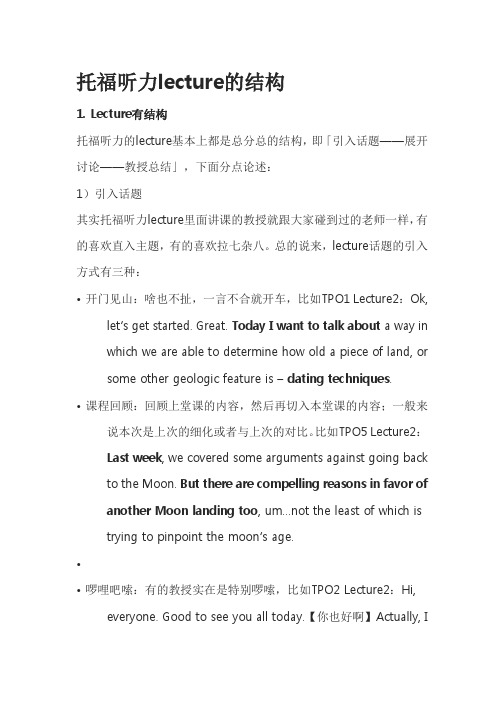
托福听力lecture的结构1. Lecture有结构托福听力的lecture基本上都是总分总的结构,即「引入话题——展开讨论——教授总结」,下面分点论述:1)引入话题其实托福听力lecture里面讲课的教授就跟大家碰到过的老师一样,有的喜欢直入主题,有的喜欢拉七杂八。
总的说来,lecture话题的引入方式有三种:•开门见山:啥也不扯,一言不合就开车,比如TPO1 Lecture2:Ok, let’s get started. Great. Today I want to talk about a way in which we are able to determine how old a piece of land, or some other geologic feature is –dating techniques.•课程回顾:回顾上堂课的内容,然后再切入本堂课的内容;一般来说本次是上次的细化或者与上次的对比。
比如TPO5 Lecture2:Last week, we covered some arguments against going back to the Moon. But there are compelling reasons in favor of another Moon landing too, um…not the least of which istrying to pinpoint the moon’s age.••啰哩吧嗦:有的教授实在是特别啰嗦,比如TPO2 Lecture2:Hi, everyone. Good to see you all today.【你也好啊】Actually, Iexpected the population to be a lot lower today. It typically runs between 50 and 60 percent on the day the researchpaper is due.【来的人多不好么,说明你受欢迎啊】Um, I was hoping to have your exams back today【啊,要放榜啦?】, but, uh, the situation was that I went away for the weekend, and I was supposed to get in yesterday at five, and Iexpected to fully complete all the exams by midnight or so, which is the time that I usually go to bed, but my flight was delayed, and I ended up not getting in until one o’clock in the morning【你飞机晚点关我什么事啊?】. Anyway, I’ll do my best to have them finished by the next time we meet【开始上课吧,please】. OK. In the last class, we started talking about...【终于开始了…】不论是用哪一种引入方式,话题总是要出来的。
托福听力讲座类热门话题生物学常考内容分析1500字

千里之行,始于足下。
托福听力讲座类热门话题生物学常考内容分析1500字托福听力中的生物学常考内容分析生物学作为托福听力中的一个热门话题,经常出现在托福听力中的讲座类题型中。
以下是关于生物学常考内容的分析:1. 动物行为类:讲座可能会涉及到动物的行为和动物之间的相互作用。
例如,一场讲座可能会讨论蚂蚁的社会行为以及它们如何协作找到食物;或者讲座可能会讨论鸟类的迁徙模式和导航能力。
这些内容可能涉及到动物的社会结构、动物之间的通讯方式以及动物行为与环境适应之间的关系。
2. 植物生长类:讲座可能会讨论植物的生长和适应环境的能力。
例如,一场讲座可能会探讨植物是如何通过光合作用将阳光转化为能量的;或者讲座可能会讨论植物如何适应不同的气候条件和土壤类型。
这些内容可能涉及到植物生长的过程、植物的营养需求以及植物在特定环境中的适应策略。
3. 生态系统类:讲座可能会涉及到生态系统的组成和生态系统中不同生物之间的相互关系。
例如,一场讲座可能会讨论大型食肉动物如何在生态系统中保持平衡;或者讲座可能会讨论人类活动如何对生态系统产生影响。
这些内容可能涉及到食物链和食物网、生物多样性以及人类对生态系统的影响。
4. 遗传学类:讲座可能会涉及到遗传学的基本原理和遗传变异的产生。
例如,一场讲座可能会讨论基因是如何决定个体的特征的;或者讲座可能会讨论基因突变如何引发遗传疾病。
这些内容可能涉及到DNA结构和功能、基因表达和调控以及遗传变异的产生机制。
第1页/共2页锲而不舍,金石可镂。
在备考过程中,考生可以通过阅读相关的生物学文章,扩充自己的生物学知识。
同时,考生还可以关注一些相关的科学新闻和文献,了解最新的生物学研究成果。
此外,考生还可以通过练习托福听力试题,熟悉生物学相关的词汇和表达方式,提高自己的听力技巧和理解能力。
TPO话题分类整理
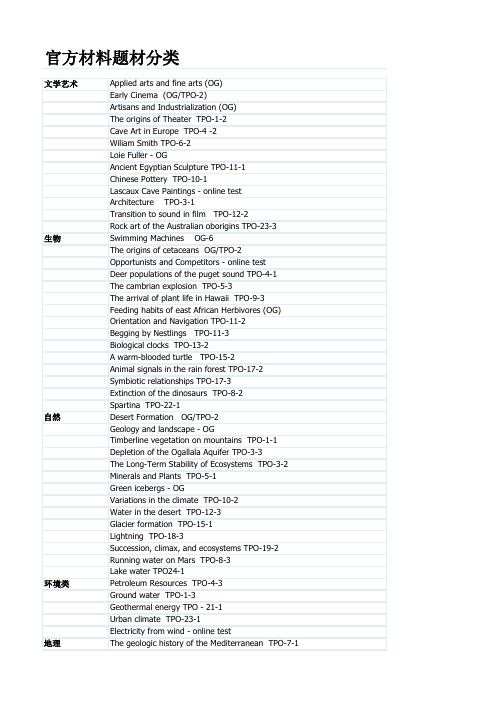
官方材料题材分类文学艺术Applied arts and fine arts (OG)Early Cinema (OG/TPO-2)Artisans and Industrialization (OG)The origins of Theater TPO-1-2Cave Art in Europe TPO-4 -2Wiliam Smith TPO-6-2Loie Fuller - OGAncient Egyptian Sculpture TPO-11-1Chinese Pottery TPO-10-1Lascaux Cave Paintings - online testArchitecture TPO-3-1Transition to sound in film TPO-12-2Rock art of the Australian oborigins TPO-23-3生物Swimming Machines OG-6The origins of cetaceans OG/TPO-2Opportunists and Competitors - online testDeer populations of the puget sound TPO-4-1The cambrian explosion TPO-5-3The arrival of plant life in Hawaii TPO-9-3Feeding habits of east African Herbivores (OG)Orientation and Navigation TPO-11-2Begging by Nestlings TPO-11-3Biological clocks TPO-13-2A warm-blooded turtle TPO-15-2Animal signals in the rain forest TPO-17-2Symbiotic relationships TPO-17-3Extinction of the dinosaurs TPO-8-2Spartina TPO-22-1自然Desert Formation OG/TPO-2Geology and landscape - OGTimberline vegetation on mountains TPO-1-1Depletion of the Ogallala Aquifer TPO-3-3The Long-Term Stability of Ecosystems TPO-3-2Minerals and Plants TPO-5-1Green icebergs - OGVariations in the climate TPO-10-2Water in the desert TPO-12-3Glacier formation TPO-15-1Lightning TPO-18-3Succession, climax, and ecosystems TPO-19-2Running water on Mars TPO-8-3Lake water TPO24-1环境类Petroleum Resources TPO-4-3Ground water TPO-1-3Geothermal energy TPO - 21-1Urban climate TPO-23-1Electricity from wind - online test地理The geologic history of the Mediterranean TPO-7-1The rise of Teotihuacan TPO-8-1心理与生理Aggression (OG)Infantile Amnesia TPO-6-3Methods of studying infant perception TPO-13-3Children and advertising TPO-14-1The mystery of yawning TPO-18-2 也可归入生命类Autobiographical memory TPO - 21-3Breathing during sleep TPO24-2科学技术Development of the periodic table TPO-16-2The birth of photography TPO22-2政治&社会&文明探奇Powering The Industrial revolution TPO-6-1Ancient Rome and Greece TPO-7-2Agriculture,Iron,and the Bantu peoples TPO-7-3Colonizing the Americas via the Northwest Coast TPO-9-1Seventeenth-century European Economic Growth TPO-10-3Which hand did they use? TPO-12-1Types of social groups TPO-13-1Pastoralism in Ancient Inner Eurasia TPO-14-3Maya water problems TPO-14-2Trade and ancient Middle East TPO-16-1Europe's early sea trad with Asia TPO-17-1Industrialization in the Netherlands and Scandinavia-TPO-18-1The Roman army's impact on Britain TPO - 19-1Westward migration TPO - 20-1The origins of agriculture TPO-21-2The rise of Teotihuacan TPO-8-1 也可划入人类学Reflection in teaching TPO-9-2考古、地质与人类学Meteorite Impact and Dinosaur Extinction - official sample testExtinction of the Dinosaurs TPO-8-2Mass extinctions TPO-15-3Discovering the Ice Ages TPO-19-3Early settlements in Southwest Asia TPO-20-2Forssil preservation TPO-20-3Seventeenth-century Dutch agriculture -TPO23-2Moving into Pueblos TPO24-3The origin of the pacific island people TPO-5-2天文学Running water on mars TPO-8-3Planets in our solar system -TPO-16-3The Allende meteorite - TPO-22-3分类方式可能也有争议之处,仅作为复习参考。
托福听力学科分类(完全修正版)(可编辑修改word版)
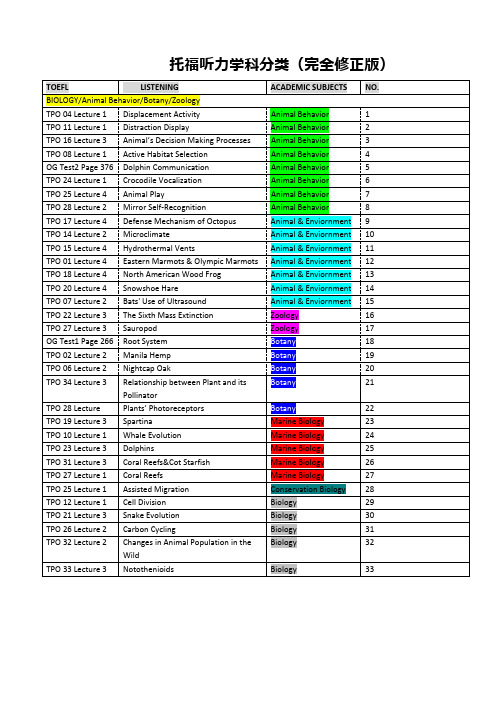
8
TPO 22 Lecture 2
Faint Young Sun Paradox
Astronomy
9
TPO 24 Lecture 4
Shield Volcanoes on Venus
Astronomy
10
TPO 26 Lecture 3
The Orbits of Comets
Astronomy
ArtHistory
11
TPO 21 Lecture 4
Alice Neel (Artist)
Art History
12
TPO 33 Lecture 4
Renaissance Gardens
ArtHistory
13
TPO 34 Lecture 1
Dada
ArtHistory
14
TPO 15 Lecture 3
Nightcap Oak
Botany
20
TPO 34 Lecture 3
Relationship between Plant and its
Pollinator
Botany
21
TPO 28 Lecture
Plants’ Photoreceptors
Botany
22
TPO 19 Lecture 3
Spartina
Animal & Enviornment
13
TPO 20 Lecture 4
Snowshoe Hare
Animal & Enviornment
14
TPO 07 Lecture 2
Bats' Use of Ultrasound
TPO听力按学科分类词汇
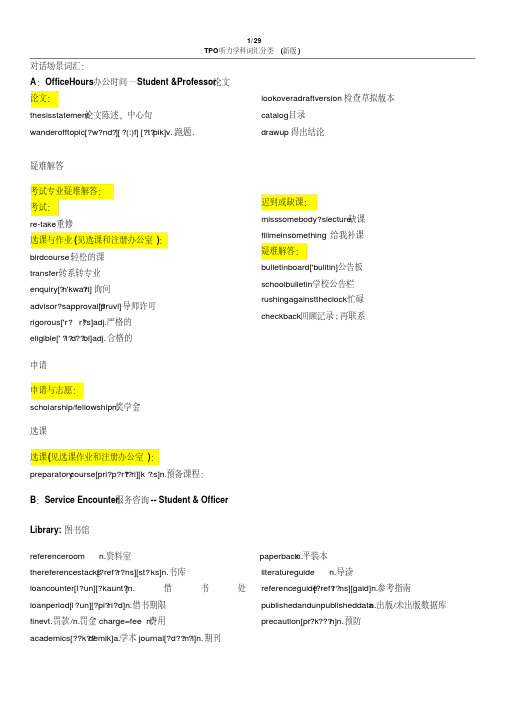
对话场景词汇:A:OfficeHours办公时间—Student &Professor论文论文:thesisstatement论文陈述,中心句wanderofftopic[?w?nd?][?(:)f][?t?pik]v.跑题. lookoveradraftversion检查草拟版本catalog目录drawup得出结论疑难解答考试专业疑难解答:考试:re-take重修选课与作业(见选课和注册办公室):birdcourse轻松的课transfer转系转专业enquiry[?n'kwa?ri]询问advisor?sapproval[?'pruvl]导师许可rigorous['r?ɡ?r?s]adj.严格的eligible['?l?d??bl]adj.合格的迟到或缺课:misssomebody?slecture缺课fillmeinsomething给我补课疑难解答:bulletinboard['bulitin]公告板schoolbulletin学校公告栏rushingagainsttheclock忙碌checkback回顾记录; 再联系申请申请与志愿:scholarship/fellowshipn.奖学金选课选课(见选课作业和注册办公室):preparatory course[pri?p?r?t?ri][k?:s]n.预备课程:B:Service Encounter服务咨询-- Student & Officer Library:图书馆referenceroom n.资料室thereferencestacks[?ref?r?ns][st?ks]n.书库loancounter[l?un][?kaunt?]n.借书处loanperiod[l?un][?pi?ri?d]n.借书期限finevt.罚款/n.罚金charge=fee n.费用academics[??k??demik]a.学术journal[?d??:n?l]n.期刊paperback n.平装本literatureguide n.导读referenceguide[?ref?r?ns][gaid]n.参考指南publishedandunpublisheddata n.出版/未出版数据库precaution[pr?'k???n]n.预防Bookstore:书店storecredit[st?:][?kredit]n.商店退款;赊账购物retreat[ri?tri:t]n.退书Cafeteria:食堂restaurant/dining room[?da?n??][ru:m]n.餐厅deepfriedfood[di:p][fraid][fu:d]n.油炸食物Registrar’sOffice:注册办公室注册(见选课和考试选课作业):fieldwork[fildw?k]/research[ri?s?:t?]n.实地研究academicrecordn.学业成绩financialaid 助学金facultyadvisor:指导老师生活指导facilitiesmanager:后勤经理auditorium[??:di?t?:ri?m]n.礼堂,会堂CounselingCenter:咨询中心银行和工资counselor [?kauns?l?]n.咨询员paycheck['peit?ek]n.薪水payroll[?peir?ul]n.工资单;薪水册CareerServices Office:就业服务办公室实习与打工:intern n.实习生career/jobfairn.招聘会advancement=promotion[pr??m?u??n]n.晋升CampusActivities.校园活动校内活动:offcampus 校外commute [k?'mj?t]v.通勤flyers[?flai?z]n.传单讲座学科词汇:讲座场景A--Art艺术Art艺术美术:fineart[fain][ɑ:t]n.美术academy[??k?d?mi]n.学院;研究院studio[?stju:di?u]n.工作室;画室salon[s??l?n]n.沙龙,美术展览馆theRenaissance[?r?n??zans]n.文艺复兴tribalart[?traib?l][ɑ:t]n.部落艺术abstractart [??bstr?kt][ɑ:t]n.抽象派avant-garde[,?v??'ɡɑ:d]n.前卫派realism[?ri?liz?m]n现实主义impressionism[?m?pre??n?z(?)m]n.印象主义impressionisticstyle[?m,pre??'n?st?k]印象派风格Dadaism.[?dɑ?d?iz?m]n.达达派,达达主义neoclassical[?ni??u kl?sik?l]adj.新古典主义的realistic[ri??listik]adj.现实主义的minimalist['m?n?m(?)l?st]n.简单抽象派艺术家precursor[pr?'k??s?]n.先驱figurehead['f?g?hed]名誉领袖critic['kr?t?k]n.批评家amateur[,?m?t?]n.业余艺术家oilpainting油画watercolor水彩画engraving[?n'gre?v??;en-]n.版画muralpainting['mj??r(?)l]/fresco['fresk??]n.壁画caveart[keiv][ɑ:t]n.洞穴壁画charcoaldrawing['t?ɑ?k??l]木炭画sketch[sket?]n.速写/素描caricature['k?r?k?tj??;'k?r?k?t???]n.漫画animatorn.漫画家panorama [p?n?'rɑ?m?] n.全景画sculpture[?sk?lpt??]n.雕塑statue['st?tju?;-t?u?]n.塑像bust[b?st]n.半身雕塑像sculptorn.雕塑家decoration[?dek??rei??n]=adornment[??d?:nm?nt]n.装饰品stainedglass[ste?nd`gl?s]n.彩色玻璃weaving[?wi?.v??]n.织动,编织mosaic[m?u?zei-ik]n.马赛克ceramics[si?r?miks]n.制陶术,制陶业reproduction/replica [ri?pr?'d?k?(?)n]['repl?k?]复制品brushstroke[br??][str?uk]n.一笔,绘画技巧texture[?tekst??]n.质地,纹理perspective[p?'spekt?v]透视画法brush[br??]n.画笔drawingboard画板canvas[?k?nv?s]n.画布,帆布indigo['?nd?g??]靛蓝layer[,lei?]n.垫片,层framing['fre?m??]n.装框paste[pe?st]v.裱糊scene[si:n]n.景色naturescene[?neit??][si:n]n.场景,景色landscape[?l?ndskeip]n.风景posture[?p?s t??]n.姿势facial[?fei??l]adj.面部的,表面的gesture [,d?est??] n.造型printingpress[?printi?][pres]n.印刷机lightproof[,laitpru:f]adj.不透光image[,imid?]n.影像prehistory[?pri?hist?ri]n.史前era[?i?r?]n.时代;年代;纪元season [,si:z?n]n.适合某种活动的季节,期间rank[r??k]v.分等级appeal[??pi:l]v.对……有吸引力makeaname[meik][?][?neim]v.出名,成名clergy[?kl?:d?i]n.神职人员;牧师;僧侣ChristianChurch:[?krist??n][t??:t?]n.基督教教会monastery[?m?n?stri]n.修道院;僧侣prayerbook [?pre?] [buk]n.祈祷书knight[nait]n.骑兵,骑士戏剧电影摄影:drama[,drɑ:m?]n.戏剧dramaturge[,dr?m??t?:d?]n.剧作家tragedy[,tr?d?idi]n.悲剧puppetshow[,p?pit-??u]n.木偶剧script[skript]n.剧本earlyversion[??:li][?v?:??n]n.早期版本theatricaltext[θi??trik?l-tekst] n.戏剧文本producer[pr??dju:s?]n.制片人film[film]n.=movie[?mu:vi]n.=motionpicture[?m?u??n][?pik t??]n.电影production[pr??d?k??n]n.作品,成品,电影制片director[di?rekt?]n.导演documentarist[?d?k j?ˋment?r?st]n.纪录片导演documentary [?d?kju?ment?ri]n.纪录片portray[p?:?trei]vt.描绘,扮演cast[kɑ:st]v.指定角色audition[?:?di??n] v.在试演中评估某一人物performer[p??f?:m?]n.表演者acrobat[,?kr?b?t]n.杂技演员juggler[,d??ɡl?]n. 玩杂耍的人mime[maim]n.滑稽演员,哑剧演员,丑角clown[klaun]n.小丑puppeteer[p?pi?ti?]n.演木偶戏的人pantomime[,p?nt?maim]n.哑剧表演minstrel[,minstr?l]n.诗歌演唱者audience [??:di?ns]n.观众,听众,读者theater[?θi?t?]n.=cinema[?sinim?]n.电影院scenery[,si:n?ri]n.舞台布景imitation[,imi?tei??n]n.道具costume[,k?stju:m]n.装束makeup[,meik?p]n.化妆品characteristic[?k?rikt??r istik]n.特征,特质stereotype:[?steri?taip]n.刻板印象,成见,定型行为hybrid[?haibrid]n.混合;混血narration [n??rei??n]n.叙事,讲述standard[?st?nd?d]n.标准framework[,freimw?:k]n.结构photography [f??t?gr?fi]n.摄影film[film]n.胶片expose[iks?p?uz]v.曝光,暴露exposure [iks?p?u??] n.曝光sensitizedpaper[,sensitaizd-'peip?]n.感光纸emulsion[i?m?l??n]n.感光乳剂high-tech[ha??t ek]n.高科技equipment[i?kwipm?nt]n.设备processing[pr?u?sesi?]n.处理entertain [,ent??tein]v.娱乐n??ve?t?(r)]n.改革者pioneer[?pai??n i?]n.先驱innovator[ˋ?inventor发明家mechanic[m?'k?n?k]机械工proprietor[pr?'pra??t?]业主feminist ['f?m?n?st]女权主义者humanitarian[hj?,m?n?'te?r??n]人道主义者apprentice[?'prent?s]学徒disciple[d?'sa?p(?)l]n.学徒crew[kru:]n.全体人员mortal['m??t(?)l]犯人renowned[ri?naund]adj.著名的householdadj.家庭的/家喻户晓的classicadj.经典的traditional[tr??di??n?l]adj.传统的immortal[?'m??t(?)l]adj.不朽的/神uniqueadj.唯一的/独特的versatile['v??s?t a?l]adj.(人)多才多艺的(物)多功能的innocent['?n?s(?)nt]adj.天真的/无罪的romantic adj.浪漫的oddadj.怪诞的/奇数的erratic[?'r?t?k]adj.奇怪的eccentric[?k'sentr?k;ek-]adj.古怪的weirdadj.怪异的/不可思议的emotionaladj.情绪的/情感的emotiveadj.感人的sentimental[sent?'ment(?)l]adj.感伤的/多愁善感的cheerlessadj.无精打采的/无生命力的clumsy['kl?mz?]adj.笨拙的rigid['r?d??d]adj.僵化的spare[spe?]adj.简朴的zigzag['z?gz?g]adj.曲折的symbolic[s?m'b?l?k]adj.象征性的contemplative[?k?n templeitiv]adj.沉思的;冥想的-]adj.讽刺的sarcastic[sɑ:?k?stik,sɑradj.真正的,真实的;可信的authentic[?:?θentik]accessible[?k?ses?b?l]adj.易接近的;可进入的;可理解的daydream[?de?dri?m]n.白日梦nightmare[?naitme?]n.噩梦音乐:Musicfolkmusic民间音乐hillbillymusic['h?lb?l?] 乡村音乐chambermusic[?t?eimb?] [?mju:zik]n.室内音乐symphony[?simf?ni]n. 交响乐Broadwaymusical:[?br?:dwei][?mju:zik?l]n.百老汇音乐剧musician[mju(:)?zi??n]n.音乐家composer[k?m?p?u z?]n.作曲家;作家critic[?kritik]n.评论家;批评者choir [?kwai?]n.合唱队chorus [?k?:r?s]=choir[?kwai?]n.合唱队noten.音符step[step]n.音级scale[skeil]n.音阶tone[t?un]n.音调pitch[pit?]n.音高volume[,v?lju:m] n.音量register[,red?ist?]n.音域solo['s??l??]独奏/独唱harmonyn.和声chord[k??d]n.和弦melody[?mel?di]n.旋律;歌曲rhythm['rie?m,'riθ?m]n.节奏韵律rhythmicpatterns['riemik-'p?t?nz]n.有节奏的模式notation[n?u?tei??n]n.谱号(musicalnotation:音乐记谱) score[sk?:]n.乐谱composition[,k?mp??zi??n]n.乐曲movementn.乐章lullaby['l?l?ba?]催眠曲sonata[s?'nɑ?t?]奏鸣曲serenade[ser?'ne?d]小夜曲vocalmusic声乐bandmusic/windmusic管乐orchestra [??:kistr?]n. 管弦乐队conducting指挥podium['p??d??m]指挥台accompaniment[?'k?mp(?)n?m(?)nt]n.伴奏musicalinstrument 乐器stringinstrument[stri?][?instrum?n t]n.弦乐器keyboardinstrument 键盘乐器percussioninstrument[p??k???n][?instrum?nt]n.打击乐器violin[?vai??lin]n.小提琴;小提琴手viola[vi??ul?]n.中提琴,中提琴演奏者cello [?t?el??] n.大提琴fhorn号;喇叭clarinet[kl?ri?net]n.单簧管;竖笛,黑管pounddrum击鼓formal[?f?:m?l]adj.正式的improvisational[??mpr?va?ˋze???n?l]adj.即兴的fanatical[f?'n?tikl]狂热的建筑:Architecturearchitect[?ɑ:kitekt]n.建筑师buildingtechnique建筑工艺craftingn.工艺;手工aesthetic[i:s?θetik]adj.美学的school[sku:l]n.学派guild[ɡild]n.协会design设计designelement设计元素nteriordesign[in?ti?ri?-di'zain]n.室内设计construct[k?n'str?kt]n.结构compactstructure[?k?mp?kt][?str?kt??]n.紧凑的结构component[k?m?p?un?nt]n.零件,构件composing[k?m'p?uzi?]n.组成tension[,ten??n]n.绷紧状态cube[kju?b]n.立方体facade[f??sɑ:d]n.(建筑物的)外立面,尤指正面alignment[??lainm?nt]n.直线排列parallel[,p?r?lel]adj.平行的fine[fain]adj.(区别)微小的;细微的flat[fl?t]adj.扁平的immense[i?mens]adj.极大的molten[,m?ult?n]adj.熔化的;熔融的archives['a:kaivz]档案馆planetarium[,pl?n?'te?r??m]天文馆aquarium[?'kwe?r??m]水族馆skyscraper[,skai?skreip?]n.摩天大楼officebuilding写字楼cabin['k?b?n]n.小木屋cathedral[k?'θi?dr(?)l]n.大教堂mosque[m?sk]清真寺castle['kɑ?s(?)l]n.城堡Gothic[,ɡ?θik]adj.哥特式的pyramid金字塔thestatueofliberty自由女神像thetriumphalarch[ɑ?t?]凯旋门celebrated[,selibreitid]adj.著名的roof[ru:f]n.屋顶dome [d?um]n.穹顶arch[ɑ:t?]n.拱(连柱的)ceiling [,si:li?]n.天花板marbleslab['mɑ?bl-sl?b]n.大理石板skeleton[,skelitn]n.框架结构整体框架steelgirder[sti:l][?g?:d?]n.钢梁metal-frame金属结构mat[m?t]n.垫子pedestal['pedist?l]n.基架,基座doorway[,d?:wei]n.门口corridor[,k?rid?:]n.走廊staircase[,st??k eis]n.楼梯electricelevator[i?lektrik-,eliveit?]n.电梯dwelling[,dwel??]n.住处,居住空间fountain[,fauntin]n.喷泉lamp[l?mp]n.灯chimney[,t?imni]n.烟囱drainer[,drein?]n.下水道装置,滤水器sewer[sju?]n.排水沟pipeline[,paiplain]n.管道,输送管道canal[k??n?l]n.运河timber[,timb?]n.木材splint[splint]n.薄木条lime[laim]n.石灰plaster[,plɑ:st?]n.石膏mortar[,m?:t?]n.砂浆,灰浆tile[tail]n.饰面砖,瓷砖fiber[,faib?]n.纤维hemp[hemp]n.大麻纤维newmaterial新材料prototype['pr??t?ta?p]n.原型portrait[,p?:trit] n.肖像sphinx[sf??ks]n.狮身人面像sculpt[sk?lpt]v.雕刻pastel[p?s?tel] n.彩色蜡笔画parchment[,pɑ:t?m?nt]n.羊皮纸decoration[?dek??r ei??n]=adornment[??d?:nm?nt]n.装饰品pour[p?:]v.浇注erect[i?rekt]v.竖立,建立hammer[,h?m?]v.锤打imold[m?uld]v.塑造cohere[k?u?hi?]v.粘合converge[k?n?v?:d?]v.聚合于,集中于一点span[sp?n]v.(桥、拱等)横跨fabricweaving[,f?brik-'wi?vi?]n.纺织,编织城市规划:City Planninglayout [?leiaut]n.布局downtown[?daun?taun]n.市中心suburb[?s?b?:b]n.郊外country=ruralarea[?k?ntri]=[?ru?r?l][???ri?]n.农村residentialarea[?rezi?den??l][???ri?]n.住宅区localresident[?l?uk?l][?rezid?nt]n.当地居民dweller[?dwel?]n.居民inhabitant[in?h?bit?nt]n.居民sidewalk[?saidw?:k]n.人行道pedestrianmall[pi?destri?n][m?:l]n.步行街off-limits[??f?l?m.?ts]n.禁区,禁止进入transportationhub[?tr?nsp?:?tei??n][h?b]n.中转港busterminal[b?s][?t?:min?l]n.公车终点站facilitate[f??siliteit]v.提供便利privatelyowned[,praivitli-?und]adj.私有的publiclyowned[,p?blikli:-?und]adj.公有的publicutility[,p?blik-ju?tiliti]n.公用事业vehicle[,vi:ikl]n.交通工具parkingarea/lot[?pɑ?ki?][???ri?]/[l?t]=carpark[k=stoppingplace[?st?pi?][p leis]n.停车场automobile[??:t?m?ubi:l]=car[kɑ:]=vehicle[?vi:ik?l]n.汽车subwaystation[?s?bwei][?stei??n]=underground[??nd??graun d]n.地铁文学:Literaturecreategenre[???nr?]n.文体fairytale[?fe?.ri.te?l]n.童话;神话folktale[f?ulk][teil]n.民间故事mythology[mi?θ?l?d?i]n.神话;神话学;神话集allegory[??liɡ?ri]n.寓言legend[?led??nd]n.传说novel[?n?v?l]=fiction[?fik??n]n.小说sciencefiction[?sai?ns][?fik??n]n.科幻小说prosen.=essay[?esei]n.散文descriptiveprose[d?'skr?pt?v] 描写性散文narrative prose ['n?r?t?v]叙述性散文poetry[?p?uitri]=poem[?p?u im]n.诗歌autobiography[??t?b a?'?gr?f?]n.人物传记charactersketch [?k?rikt?][sket?]n.素描,人物速写”lyrics[?liriks]n.抒情诗ballad ['b?l?d]民谣proverb ['pr?v??b]谚语editorial[?edi?t?:ri?l]n. 社论type[taip]n.类型style[stail]n.风格works[w?:ks]n.作品author[??:θ?]n.作者storytellers[?st??ri?tel?]n.说故事的人satirist['s?t?r?st]讽刺作家biographer[ba?'?ɡr?f?]自传作家imagist['imid?ist]意象派诗人troubadour[?tru?b?du?]n.行吟诗人literacy[?lit?r?si]n.读写能力;精通文学literarycriticism文学批评literarystudies文学研究comment [?k?ment]n.评论schoolsofliterature文学流派realism['r??l?z(?)m]现实主义surrealism[s?'r??l?z(?)m]超现实主义modernism['m?d(?)n?z(?)m]现代主义aestheticism[i?s'θet?s?z(?)m;es-]唯美主义character[?k?rikt?]n.人物,角色,性格leadingcharacter主人公major/maincharacter[?meid??]/ [mein][?k?rikt?]=roundc haracter[raund][?k?rikt?]n.主角minorcharacters[?main?][?k?rikt?]=flatcharacter[fl?t][?k ?rikt?]n.配角characters?personalities[?k?rikt?s][?p?:s??n?liti]n.人物个性people?strait[?pi:plz][treit]n.人物特质modeln.人物原型stereotype:[?steri?taip]n.刻板印象,成见,定型行为background[?b?kgraund]n.背景setting[?seti?]n.场景prelude['prelju?d]序曲prologue['pr??l?g]n.序言mainplot[pl?t]n主要情节obligatoryscene[??blig??t?ri][si:n]n.必须的情节incident[?insid?nt]n.事件.ending[?endi?]=denouement [dei?nu:mɑ?]n.结局quotation[kw?u?tei??n]n.引用语fortune[?f?:t??n?t]n.命运,运气servant[?s?:v?nt]n.仆人master[?mɑ:st?]n.主人royalty[?r?i?lti]n.皇室prince[?prins]n.王子princess[?prin?ses]n.公主knight[nait]n.骑兵,骑士chivalry[??iv?lri]n.侠气,骑士精神clergy[?kl?:d?i]n.神职人员;牧师;僧侣religion[ri?lid??n]n.宗教;宗教信仰ChristianChurch:[?krist??n][t??:t?]n.基督教教会museum[mju(:)?zi?m]n.博物馆entertainment[?ent??teinm?nt]=recreation[?rekri?ei??n]=amuse ment[??mju:zm?nt]n.娱乐formula[?f?:mjul?]n.准则,公式universaltruth[?ju:ni?v?:s?l][tru:θ]n.真理theinciting[e?][in?saiti?]n.刺激logical[?l?d?ik?l]adj.合乎逻辑的appreciate[??pri:?ieit]vt.欣赏戏剧(见艺术电影摄影):drama[?drɑ:m?]=theater[?θi?t?]=play[plei]n.戏剧opera[??p?r?]n.歌剧well-madeplay[wel][meid][plei]n.佳构剧comedy[?k?midi]n.喜剧portray[p?:?trei]vt.描绘舞蹈:Danceballet[b??le?]n.芭蕾舞toeshoe[ˋt???u?]n.芭蕾舞鞋choreography[?k?ri??gr?fi]n.编舞choreographer[,k?ri'?ɡr?f?]舞蹈编排家讲座场景B--SocialScience 社会科学考古:ArchaeologyStoneAge石器时代Paleolithic [,p?l???'l?θ?k]旧石器时代的the Paleolithic period/age [e?][?p?li?u?liθik][?pi?ri?d]/ [eid?]=theOld/lateStoneAge[e?][?uld]/[leit][st?un][eid?]n.旧石器时代Mesolithic [?m?s???l?θ?k]中石器时代的Neolithic[?ni????l?θ?k]新石器时代的theNeolithicperiod/age[e?][?ni:?u?liθik][?pi?ri?d]/[eid?]=Newstoneage [nju:][st?un] [eid?]n.新石器时代BronzeAge[br?nz](青)铜器时代IronAge铁器时代primitive [?primitiv]n.原始人,adj原始的ancestor[??ns?s t?]祖先caveman山顶洞人nomad [?n?um?d]n.游牧民clan[kl?n]氏族tribe[tra?b]部落alliance[??lai?ns]=federation[?fed??r ei??n]n.联盟homogeneous[?h??m??d?i?n??s?h?m-]同一种族(种类)的archeologist[,ɑ:ki'?l?d?ist]考古学家antiquity [?n?t?kw?t?]古代,古老ancientcivilization[,s?v?l?'ze??n]古代文明grave=tomb[greiv]=[tu:m]n.坟墓ruins [?ru??n]遗迹,废墟remains[r?'me?nz]遗产/遗骸skull[sk?l]颅骨cranial['kre?n??l]颅骨的historicalrelic [his?t?rik?l] [?relik]n.遗迹culturalrelics['r?liks]文物relic [?r?l?k]遗物,文物antique[?n'ti?k]古物/古董artifact[?ɑ?t??f?kt]手工艺品utensil[ju:?tens?l]n.餐具,炊具cookingcontainer [?kuki?][k?n?tein?]n.容器canoe[k??nu:]独木舟obsidian[?b?sidi?n]n.黑曜石covert['k?v?t]n.隐藏处shelter[??elt?]n.庇护所religion[ri?lid??n]n.宗教ritual[,rit?u?l]n.(宗教)仪式originate[??r?d???n e?t]起源于inhabit[in?h?bit]vt.居住于bury[?beri]v.埋葬excavate/unearthv.挖掘excavation[?eksk??vei??n]n.挖掘历史:Historyera [?i?r?]n.时代;年代;纪元prehistory[?pri?hist?r i]n.史前ancientRome/Greek [?ein??n t] [r?um]/[gri:k]n.古罗马/希腊medieval[,medi'i:v?l,]adj.中世纪Europe[?ju?r?p]n.欧洲Britain [?brit?n]n.英国Italy[?it?li]n.意大利Rome(Roma) [r?um]n.罗马Greek [gri:k]n.希腊Egypt[?i:d?ipt]n.埃及France [?fr?ns]n.法国Germany [?d??:m?ni] n.德国Spain [spein]n.西班牙Turkey[?t?:ki]n.土耳其(Turkish)Netherlands[?nee?l?ndz]=Holland[?h?l?nd]n.荷兰(Dutch荷兰人)Canada[?k?n?d?]n.加拿大(Canadian[k??neidi?n]n.加拿大人)MountRushmore 拉什莫尔山(位于美国南达科他州)总统山;人类学:Anthropologyecologicalanthropologist [?i?k??l?d??k?l]生态人类学家p?l?d??st]人类学家anthropologist[??nθr??p?l?d??]古人类学家paleoanthropologist[?p?l?????nθr??psychologicalanthropologist [?sa?k??l?d??k?l]心理人类学家Native American[?neitiv][??merik?n]n.美洲原住民,印第安人patriarchal[,peitri'ɑ:k?l]adj.家长的/族长的哲学:Philosophyphilosophy[fi'l?s?fi,f?-]n.哲学;哲理;人生观Aristotle?sethicaltheory[??rist?tlz] [?eθik?l][?θi?ri]n.伦理学AncientGreekphilosopher [?ein??nt][gri:k][fi?l?s?f?]n.古希腊哲学家Socrates[?s?kr?ti:z]苏格拉底;Plato[?pleit?u]柏拉图;Aristotle[??rist?tl]亚里士多德ideology [?a?d???l?d??]意识形态intellect['int?lekt]n.智力,理解力;知识分子;思维逻辑领悟力;智力高的happiness[?h?pinis]n.幸福fame[feim]n.名声,名望external[ik'st?:n?l]adj.外部的;表面的optimism['?ptimiz?m]n.乐观;乐观主义心理学:Psychologybaby[?beibi]=infant[?inf?nt]=nursling[?n??sli?]n.婴儿kid[kid]n.儿童teenager[?ti:neid??]n.十三至十九岁的人youngpeople[j??][?pi:pl]n.年轻人adult[??d?lt]n.成年人oldpeople[?uld][?pi:pl]=theaged[e i:][eid?d]=elderlypeople[ ?eld?li][?pi:pl]=seniorcitizens[?si:ni?][?sitiz?nz]老年人mature[m??tju?]vt.使成熟majority[m??d??r?t?]n.多数人minority[ma??n?r?t?m?-]n.少数人conformity[k?n?f??m?t?]n.从众individual[?indi?vid?u?l]n.个体,个人self-reliance[,self-ri?lains]n.依靠自己,自立participate[pɑ:?tisipeit]v.参与behaviorism[b??h e?v??r?z(?)m]n.行为主义psychoanalysis[?saik?u??n?lisis]n.精神分析egocentric[?i:g?u?sentrik]adj.自我中心的;利己主义的mentalprocesses:[?mentl][?pr?u ses]n.心理历程mental[?mentl]心理的founder[?faund?]n.创始人Archimedes[?ɑ?ki?mi?di?z]n.阿基米德mentalprocess[?mentl][?pr?u ses]n.思维过程thought[θ?:t]n.思想,想法cognition[k?ɡ?ni??n]n.认识cognitivecapacity[?k?gnitiv][k??p?siti]n.认知能力ideomotor action[?aidi??m?ut?] [??k??n]n.意识,观念运动motivation[,m?uti'vei??n]n.动机;积极性;推动intention[in?ten??n]n.意图,目的intuitive[in?tju:itiv]adj.直觉的hypotheses[hai?p?θisis]n.假定;臆测conscience[?k?n??ns]n.道德心,良心virtuous['v?:t?u?s]adj.善良的;有道德的curiosity[?kju?ri??siti]n.好奇心generous[?d?en?r?s]adj.慷慨的,大方identity[ai?dentiti]n.身份;同一性fame[feim]n.名声,名望spiritual[?s p?r?tj??l]心灵的soul[s?ul]n.灵魂;心灵physical [?f?z?k?l]身体的,物质的,物理的behavior[bi'heivj?]n.行为,举止;habit[?h?bit]n.习惯muscle[?m?s?l]n.肌肉sign language[sain][?l??gwid?]n.手语,符号语音ut]n.喉咙,嗓子throat[θr?laryngeal[l??rind?i?l]adj.喉部larynx[?l?ri?ks]=voice box[v?is][b?ks]喉头subjective[s?b?d?e ktiv]adj.主观的objective[?b?d?e ktiv]adj.客观的positive/negativeelectrode[?p?z?tiv]/[?neg?tiv][??lektr??d]正/负电极迷宫maze[meiz]=labyrinth[?l?b?rinθ]n.questionnaire[?kwest???ne?]n.问卷subject[?s?b d??kt]n.受实验对象缺点obsession[?b?se??n]n.困disadvantage[?dis?d?vɑ:ntid?]n.扰deaf[def]adj.聋的blind[blaind]adj.盲abnormal[?b?n?:m?l]adj.反常的distracted[di?str?kt]adj.心烦意乱的childamnesia[t?aild][?m?ni:zi?]n儿童健忘症,记忆缺失语言学:linguistics[li??gwistiks].语言学Proto-Indo-European:[pr??.t??-][??nd??][ju?r??pi:?n] n.原始印欧语grammar[?gr?m?]n.语法verb[v?:b]v.动词noun[naun]n.名词adjective[??d?iktiv]n.形容词经济学Economics商业Businessmerchant[?m?:t??nt]n.商人adman[??dm?n]n.广告人bidder[?bid?]n.投标者client[?klai?nt]n.客户potentialcustomer[p??ten??l][?k?st?m?]n.潜在客户skilledlabor[skild][?leib?]n.熟练工人businessowner=employer[?biznis][??un?]=[im?pl?i?]老板businessconference[?biznis][?k?nf?r?ns]=seminar[?seminɑ:]n.会议industrialrevolution [in?d?stri?l][?rev??l u:??n]n.工业革命,产业革命industry[?ind?stri]n.产业,工业infrastructure[?infr??str?kt??]n.基础设施industrycluster:[?ind?stri][?kl?st?]n.产业集群alliance[??lai?ns]=federation[?fed??r ei??n]n.联盟collaborate[k??l?b?reit]vi.合作;协作urbanization[???b?nai?zei??n]n.都市化prosper[?pr?sp?]vi.繁荣flourish['flauri?]n.兴旺;茂盛affluence['?fl??ns]n.富裕,富足poverty[?p?v?ti]n.贫困boomandbust[bu:m][?nd][b?st]繁荣与萧条collapse[k??l?ps]n./vt.崩溃outofbusiness歇业,破产outofwork[aut][?v,?,?v][w?:k]n.失业GreatDepression[greit][di?pre??n]n.大萧条dotcomcrash[e?][d?t?k?m][kr??]n.互联网泡沫tulip mania[?tju:lip][?meini?]n.狂热irrational[i?r???n?l]adj.不理性的sophisticated[s?'f?st?ke?t?d]adj.世故的,老练的;复杂的,尖端的speculation[?spekju?lei??n]n.投机conflict[k?n'flikt,'k?nflikt]n.冲突variation[?ve?ri?ei??n]n.变种panic[?p?nik]n.恐慌consumerism[k?n'sju?m?r?z(?)m]n.消费主义gardening=horticulture[?ɡɑ?dn??]=[?h?:ti?k?lt??]n.园艺remotemountainous region[ri?m?ut][?mauntin?s][?ri:d??n]n.偏远山区brand=trademark[br?nd]=[?treidmɑ:k]n.品牌,商标product[?pr?d?kt]n.产品commodity[k??m?diti]n.商品luxury[?l?k??ri]n.奢侈品specimen[?spes?m?n]n.样本service[?s?:vis]n.服务nativeto[?neitiv][tu]原产至statistics[st??tistiks]n.统计学hailfrom[heil][fr?m]来自于,出产于retail[?ri:teil,ri?teil]n.v.零售promissorynote[?pr?mis?ri][n?ut]n.本票revenue[?revinju:]=income[?ink?m]n.收入disposableincome[di'sp?uz?bl][?ink?m]-money[?m?ni]n.可支配收入percapita [p??k?p?t?]人均subsistencelevel收支平衡的生活水平subsistence[s?b's?st(?)ns]n.存活,生活annualbudget[??nju?l] [?b?d?it]n.年度预算borrowing[?b?r?ui?]n.借款bank loan[b??k][l??n]银行贷款interest['intrist,'int?r-]利息check[t?ek]支票;收据;账单cost[k?st]n.成本rent[rent]n.租金tax[t?ks]n.税金profit[?pr?fit]n.利润withdraw[w?e'dr??]从银行账户中提款annualbudget[??nju?l][?b?d?it]n.年度预算taxincentive[t?ks][in?sentiv]n.税收优惠federal subsidy[?fed?r?l] [?s?bsidi]=financialassistance[f??n?n??l][??sist?ns]n.财政资助//补贴foundation[faun?dei??n]=fund [f?nd]n.基金会theNationalEndowmentfortheArtsfoundation[e?][?n???n(?)l][in?daum?nt][f?][e?][ɑ?t s]n.美国艺术基金会gold[g?uld]n.金子(区:goal目标)monetary[?m?nit?ri]adj.货币的,财政的commercial[k??m?:??l]adj.商业的;营利的guarantee[?g?r?n?ti:]v.担保mortgage[?m?:gid?]n./vt.抵押auction[??:k??n]n./vt.拍卖ns?]n.赞助人patronagepatron[?peitr?n]=sponsor[?sp?[?p?tr?n?d?]n.资助,赞助masscommunications[m?s][k??mju:ni?kei??nz]大众传播工具media[?mi:di?]=communication[k??mju:ni?kei??n]n.媒体advertisement[?d?v?:tism?nt]n.广告advertisingplan[??dv?taizi?][pl?n]n.广告策划billboard[?bilb??d]n.公告牌slogan[?sl?u g?n]n.标语;呐喊声targetagegroup[?tɑ:git][eid?][gru:p]n.目标年龄群市场调查marketresearch/survey[?mɑ:kit][ri?s?:t?]/[?s?:vei]社会学:Sociologymeme[mi:m]n.文化基因longevity[l?n?d?e viti]n.寿命fecundity[fiˋk?nd?t?]n.繁殖力,复制能力fidelity[fi?deliti]n.保真度,精准accuracy['?kjur?si]n.[数]精确度,准确性calendar['k?lind?]n.日历;[天]历法;Jupiter['d?u:pit?]n.[天]木星;朱庇特(罗马神话中的宙斯神)monumental[,m?nju'ment?l]adj.不朽的;纪念碑的;非常的enormous[i'n?:m?s]adj.庞大的,巨大的;凶暴的,极恶的政治类:PoliticsAmericanRevolution美国革命/独立战争IndependenceWar美国独立战争AmericanCivilWar美国内战theSecondWorldWar第二次世界大战military [?m?l?t?r?-tr?]adj.军事的warrior['w?ri?,'w?:-]n.战士fiftystates55个州federalsystem[?f?d?r?l]联邦制Congress[?k??gr?s]美国国会Senate[?s?n?t]参议院Democrats[?d?m??kr?t]民主党Republicans[r??p?bl?k?n]共和党election[??l?k??n]选举vote[v??t]投票veto[?vi?t??]否决council[?kauns?l]n.委员会legislation[?l?d??s?le???n]立法constitution[?k?nst??tju???n]宪法justice['d??stis]n.司法,法律制裁diplomat[?dipl?m?t]n.外交官bureaucracy[bju?r?kr?si]n.官僚主义anarchism[??n??k?z?m]n.无政府主义centralized ['sentr?laizd]adj.中央集权的radical[?r?d?k?l]adj.激进的,根本的patriotic[,p?tri'?tik]adj.爱国的inspire[in'spai?]vt.激发;鼓舞;release [r??li?s]v.释放colonize[?k?l??na?z]v.拓殖,殖民immigrant[??m?gr?nt]n.移民socialstatus[,s?u??l-?steit?s]n.社会地位讲座场景C—LifeScience生命科学动物学:biology[ba?'ɑl?d?i]生物学speciology[?spi:?i'?l?d?i]n.物种学zoology[z?u??l?d?i]n.动物学microbiology[,ma?kroba?'ɑl?d?i]微生物学marinebiology 海洋生物学entomology[?ent??m?l?d?i]n.昆虫学ornithology[,?rn?'θɑl?d?i]n.鸟类学cellbiology[sel-bai??l?d?i]n.细胞生物学biochemist[,bai?u?kemist]n.生物化学家paleontologist[,peili?n?t?l?d?ist]n.古生物学者creature[?kri:t??]n.生物organism[??:g?niz?m]n.有机物,微生物microbe['ma?krob]微生物plankton['pl??kt?n]浮游生物invertebrate[in?v?:tibr?t]n.无脊椎动物vertebrate[?v?:t?br?t,-?bret]脊椎动物amphibian[?m?fibi?n]n.两栖动物reptile[?reptail]n.爬行动物herbivore['h?:bi?v?:]n.食草动物herbivorous:[h?:?biv?r?s]a.食草的,草食的carnivore['kɑrn?v?r]食肉动物omnivorous[am?niv?r?s]a.杂食的ruminant[?ru:min?nt]n.反刍动物mollusk [,m?l?sk] n.软体动物land creature [l?nd][?kri:t??]陆地生物cold[k?uld]bloodanimal[bl?d][??nim?l]n.冷血动物warm[w?:m] bloodanimal[bl?d][??nim?l]n.热血动物mammal['m?m?l]n. [脊椎]哺乳动物primates[?pra?m?ts]灵长目动物endangeredspecies濒危动物species[?spi:?i:z]n.物种breed[bri:d]n.品种monogamous一夫一妻的/一雌一雄的polyandrous[,pɑl?'?ndr?s]一妻多夫的/一雌多雄的polygamous[p?'l?g?m?s]一夫多妻的/一雄多雌的community[k??mjun?ti]动物的群落或人的部落flock[flɑk](牛、羊等)群herd[h?d]兽群hordes/swarms [h?rd]/[sw?rm](昆虫等)群生理生化:respiratory system[ris?pai?r?t?ri-'sist?m]n.呼吸系统digestivesystem消化系统nervesystem[n?:v]n.神经系统circulatory['s?kj?l?t?ri]system 循环系统hormonal[h?r'monl]system内分泌系统reproductivesystem生殖系统、urinarysystem 泌尿系统immunesystem[i?mju:n][?sist?m]n.免疫系统motorsystemn.运动系统breed [brid](名词)品种,(动词)繁殖multiply/reproduce['m?lt?pla?]/[,ripr?'dus]繁殖offspring [??f?spri?]n.后代crossbreed['kr?:sbri:d]v.(使)杂交sperm [sp?:m]n.精子spawn[sp?n](鱼、虾、蛙等)孵fertilizer[?f?tl?a?z?]使…受精n.肥料unfertilizedegg[?n'f??t?l a?zd]未受精卵fertilizedegg[,f?:tilaizd-eg]n.受精卵pregnant[?pregn?n t]a.怀孕的emb ryo[,embri?u]n.胚胎hatchling['h?t?li?]n.刚孵化的幼体incubation[,??kju'be??n]孵化fledglings[?fled?li?]n.雏鸟cell[sel]n.细胞.蜂房cytoplasm[,sait?pl?z?m]n.细胞质cellmembrane[sel-'mem?brein]n.细胞膜cellwall[sel-w??l]n.细胞壁nucleus[,nju:kli?s]n.细胞核organelle[?:ɡ??nel]n.细胞器skincells[skin][selz]n.皮肤细胞nervecells[n?:v][selz]n.神经细胞unicellular[,ju:ni?seljul?]adj.单细胞的multicellular [,m?lti?seljul?]adj.多细胞的renewing[ri'nju:i?]n.更新metabolism[m??t?b?liz?m]n.新陈代谢hormone[?h?:m?un]n.激素,荷尔蒙insulin[,insjulin]n.胰岛素secretion[si?kri:??n]n.分泌,分泌物anatomy[??n?t?mi]n.人体解剖organ[??:g?n]n.器官vestige[?v?st?d?]n.退化器官liver[,liv?]n.肝脏lung[l??]n.肺kidney[,kidni]n.肾stomach['st?m?k]n.胃pancreas['p??kr??s]n.胰tissue[?ti?u:,-sju:]n.组织vessel[,ves?l]n.血管tendon[,tend?n] n.腱membrane[,membrein]n.膜gland[ɡl?nd]n.腺digestivegland[ɡl?nd]消化腺digestiveenzyme消化酶tentacle[,tent?kl]n.触角,触须jaw[d??:]n.颌,颚tongue[t??]n.舌头valve[v?lv]n.瓣膜skeletal['skelit?l]adj.骨骼的vertebra[,v?:tibr?]n.脊椎骨=spinal['spa?nl]cord脊椎rib[rib]n.肋骨fingerprint['fi?g??print]n.指纹nail[neil]n.指甲division [di?vi??n]n.部分beak[bi:k]n.喙,(鹰等的)嘴bill[b?l](鸟)嘴tooth[tu:θ]-teeth[ti:θ]n.牙齿toothless[?tuθl?s]adj.无齿的compoundeye[k?m?paund][ai]n.复眼fin[fin]n.鱼鳍scale[skeil]n.鱼鳞forelimb[,f?:lim] n.前肢limb[lim]n.肢,臂;分支wing[wi?]n.翅膀feather [?fee?]n.羽毛tail[teil]n.尾卫生与疾病:hygiene['ha?d?in]卫生hygienic[hai?d?i:nik]adj.卫生学的(hygiene[,haid?i:n]卫生学)sanitation[,s?n?'te??n]公共卫生;卫生设施disease[di?zi:z]n.疾病diagnose[,dai?ɡn?uz]v.诊断drug[dr?ɡ]n.药物medicine[,medisin]n.医学,药dentalclinic牙医诊所surgeon['s??d?(?)n]n.外科医生virus [,vai?r?s]n.病毒fungi[,f?nd?ai]n.真菌类yeast[jist]酵母(菌)parasite['p?r?sa?t]寄生虫parasitic [?p?r??s itik]a.寄生的,寄生虫的inflection传染/感染paralysis[p??r?lisis]n.麻痹,瘫痪cardiac[,kɑ:di?k]adj.心脏(病)的antibiotic [??ntibai??tik]n.抗生素antibody [,?nti?b?di] n.抗体vaccine[,v?ksi:n]n.疫苗fungicide[,f?nd?isaid]n.杀真菌剂营养学:nutrient[,nju:tri?nt]n.营养物质calorie [?k?l?ri]卡路里(热量单位)protein[,pr?uti:n]n.蛋白质starch淀粉glucose[,ɡlu:k?us]n.葡萄糖carbohydrate(starch)碳水化合物(淀粉)vitamin[?vit?min,vai-]n.维生素,维他命malnutrition[?m?lnju?tri??n]n.营养不良,营养不足decaffeinated[di:'k?fineitid]adj.不含咖啡因toxic[,t?ksik]adj.有毒的toxin毒素植物学:botany 植物学botanical/botanic植物学的botanist[,b?t?nist] n.植物学家herb [h?:b]n.草本植物parasiteplant['?rɡ?n]寄生植物aquatic['?nju?l]plant水生植物horticulture[?h?rt??k?lt??]园艺学system系统forest[,f?rist]n.森林jungle [?d???g?l]n.热带丛林tropicalrainforest[,tr?pikl-rein-?f?rist]n.热带雨林Tropicalsavannaforest[,tr?pikl-s??v?n?-?f?rist]n.热带稀树草原deciduousforest[di?sid?u?s-?f?rist]n.落叶林Deciduousmonsoonforest[di?sid?u?s-m?n?su:n-?f?rist]n.落叶季雨林Temperaterainforest[,temp?rit-rein-?f?rist]n.温带雨林Temperateevergreenforest[,temp?r it-?ev?ɡr i:n-?f?rist]n.温带绿叶林subarctic[,s?b?ɑ:ktik]adj.亚寒带flowering tree [?flau?ri:i?][tri:]n.会开花的树lumber[,l?mb?]n.木材lawn[l?n]草坪草原meadow[?med?u]n.草地;牧场grassland[,ɡrɑ:sl?nd]n.prairie[?pre?ri]n.大草原;牧场ranch[rɑ:nt?]n.大农场;大牧场shrub[?r?b]=bush[br??]灌木丛cluster[?kl?st?z]n.串,簇;群,组vi.群集,丛生marsh[mɑ:?]n.沼泽;湿地beach[bi:t?]n.海滩alpineregion[,?lpain-?ri:d??n]n.高山区blossom[[?blɑ:s?m]花群、开花root[ru:t]n.根stem[stem]n.茎stalk[st?k]杆petal[,petl]n.花瓣bud[b?d]花蕾column['kɑl?m]花柱pistil[,pistil]n.雌蕊stamen[,steimen]n.雄蕊wither/shrivel/fade凋谢seed[si:d]n.种子germinate[?d??:mineit]vi.发芽.shoot(sprout)[?ut][spra?t]嫩芽,抽枝rhizome['raiz?um]n.根茎,根状茎,地下茎trunk[tr??k]树干bark[bɑrk]树皮crown[kraun]n.树冠canopy [,k?n?pi] n.天篷:树林中最上面一层branch[br?nt?]树枝twig [tw?ɡ]小树枝leaf [li:f](leaves复)n.叶子leaflet['lifl?t]小叶peel(skin)[pil]果皮husk[h?sk](干)果壳/(玉米)苞叶shell(硬)[??l]果壳barren['b?r?n]贫瘠的;不生育的pesticide[?pestisaid]n.农药|杀虫剂insecticide[in'sektisaid]n.杀虫剂,农药granary(grain store) ['gr?n?ri]粮仓annual 一年一生的perennial[p?'r?n??l]多年一生的rosette[ro'z?t](叶的)丛生mutualism[,mju:tju?liz?m,?mju:t?u?liz?m]n.共生symbiosis[?simbi??usis]n.共生,共生关系symbiotic[,simbai??tik]adj.共生的考过的动物:reptile[?reptail]n.爬行动物rodent[?r?ud?nt]n.啮齿动物gorilla大猩猩chimpanzee[?t?imp?n?zi:]n.黑猩猩baboon[b?'bu:n]n.狒狒anthropoid[??nθr?p?id]a.类人猿的beast[bist]野兽wolf[wulf]n.狼cheetah['t?it?]猎豹bear[b??]vt.熊lions[?lai?n]n.狮子rat [r?t]=mouse[maus](复数mice)n.鼠squirrel[?skwir?l]n.松鼠kangaroo[?k??g??ru:]n.袋鼠marmot['mɑ:m?t]n.土拨鼠chipmunk[?t?ipm??k]n.花栗鼠meerkat['mi?k?t]n.猫鼬elephant[?elif?nt]n.大象mammoth[?m?m?θ]n.猛犸象,长毛象cattle[?k?tl]n.牛bison['baisn]n.美洲野牛buffalo[?b?f?l?u]n.水牛rhinoceros[rai'n?s?r?s]n.犀牛zebra[?zi:br?,?ze:-]n.斑马hippopotamuses[?hip??p?t?m?s]=hippo['hip?u]n.河马deer[di?]n.鹿camel[?k?m?l]n.骆驼antelope['?nt?lop]羚羊rabbit[?r?bit]n.兔子pigeon[?pid?i n]n.鸽子crow[kr?u]n.乌鸦eagle[?i:gl]n.鹰hawk[h?:k]n.鹰owl[aul]n.猫头鹰songbird[,s??b?:d]n.鸣禽hummingbird[?h?mi?b?:d]n.蜂鸟bat[b?t]n.蝙蝠colubrid[?kɑl?br?d,?kɑlj?-]n.无毒蛇类venomoussnake[?ven?m?s][sneik]n.有毒的蛇dinosaur[?dain?s?:]n.恐龙Tyrannosaurusrex[tai?r?n?'s?:r?s][reks]n.霸王龙alligator[??ligeit?]= crocodile[?kr?k?dail]n.鳄鱼turtle['t?tl]龟snake[sneik]n.蛇frog[fr?g]n.青蛙chameleon变色龙lizard[?liz?d]n.蜥蜴snail[sneil]n.蜗牛penguin[?pe?gwin]n.企鹅otter[??t?]n.水獭shrimp[?rimp]n.虾crayfish [,kreifi?]n.龙虾clam[kl?m]n.蛤crab[kr?b]n.螃蟹coral[?k?r?l]n.珊瑚beaver[?bi:v?]n.海狸dolphin[?d?lfin]n.海豚starfish[?stɑr?f??]n.海星octopus['?kt?p?s]n.章鱼whale[hweil]n.鲸鱼eel[i:l]n.鳗鱼flounder[,flaund?]n.比目鱼squid[skwid]n.鱿鱼jellyfish[,d?elifi?]n.水母oyster[,?ist?]n.牡蛎sponge[sloθ]海绵insect[?insekt]n.昆虫bug[b?ɡ]n.虫子worm[w?m]虫/蠕虫。
托福听力都有哪些题型

托福听力都有哪些题型托福听力题型可分为这6种:主旨题、功能/目的题、细节题、态度/推断题、组织结构题/分类信息题、内容连接题/排序题。
其中细节题主要是考查语言信息的了解和整合信息,对全文结构掌握的能力。
1、主旨题。
往往出现在文章引言和开头处,而重复比较多往往就是主旨。
在听课堂讲演等学术性题目时,一定要首要掌握文章最中心的主旨,主旨考题选项中过于细节的往往是错误选项。
2、功能/目的题。
该题型类似于主旨题,关于任何一个长段子,首要务必要掌握的是文章的主旨和结构,只有主旨确认了,才可以去了解细节,做揣度。
3、细节题。
细节题主要是考查关于考生对基本信息的了解能力,除此之外ETS还调查考生另外两种能力,关于语言信息的了解和整合信息,对全文结构掌握的能力。
而基本信息的了解就占到50%的比重,可见主旨题和细节题的重要性。
关于细节题,不要走入误区,觉得一切的细节会考到,去关注每一个小的细节点,以至于舍本逐末,关于细节题,掌握两个原则:第一、ETS只会考查和主旨有关的重要细节。
过于偏细节的实在没有听到,可以直接跳过;第二,牢牢掌握和考点相关的重要信号词。
4、态度/推断题。
态度题要注意经过口气、语调、重读来估测;因为讲演中的内容相对学术和客观,所以讲演中的态度题要注意经过形容词和副词的褒贬性来确认说话者的意图。
推断题掌握一条原则:正确选项往往不是文章中的直接表述,可能通过互换的方法来设置圈套,困惑考生。
5、组织结构题/分类信息题。
6、内容连接题/排序题。
最后两种题型都是视察考生关于全文结构的一个综合把握,是对考生能力的比较高的要求。
要做好这两种题型,大家在最后一周要强化熟练自己记笔记的能力。
2托福听力题型结构及题型要点1、托福听力题型结构。
新托福听力题型形式包涵 2-3个对话,每段对话后将有5个问题。
在对话中,第一个场景发生在学校办公室里,对话可能涉及学术内容或者与课程要求有关。
第二个场景是关于同学服务的对话,对话一般发生在大学校园中,包括非学术性的内容。
TPO听力按学科分类词汇
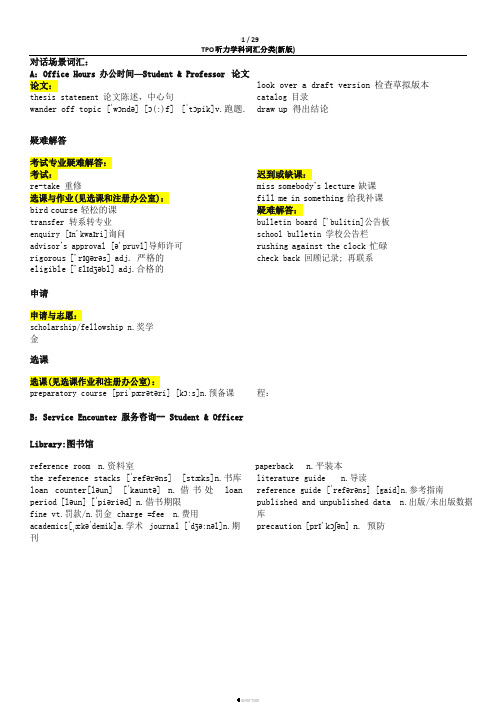
对话场景词汇:A:Office Hours 办公时间—Student & Professor 论文论文:thesis statement 论文陈述,中心句wander off topic [ˈwɔndə] [ɔ(:)f] [ˈtɔpik]v.跑题.look over a draft version 检查草拟版本catalog 目录draw up 得出结论疑难解答考试专业疑难解答:考试:re-take 重修选课与作业(见选课和注册办公室):bird course 轻松的课transfer 转系转专业enquiry [ɪn'kwaɪri]询问advisor’s approval [ə'pruvl]导师许可rigorous ['rɪɡərəs] adj. 严格的eligible ['ɛlɪdʒəbl] adj.合格的迟到或缺课:miss somebody’s lecture 缺课fill me in something 给我补课疑难解答:bulletin board ['bulitin]公告板school bulletin 学校公告栏rushing against the clock 忙碌check back 回顾记录; 再联系申请申请与志愿:scholarship/fellowship n.奖学金选课选课(见选课作业和注册办公室):preparatory course [priˈpærətəri] [kɔ:s]n.预备课程:B:Service Encounter 服务咨询-- Student & Officer Library:图书馆reference room n.资料室the reference stacks [ˈrefərəns] [stæks]n.书库loan counter[ləun] [ˈkauntə] n.借书处loan period [ləun] [ˈpiəriəd] n.借书期限fine vt.罚款/n.罚金 charge =fee n.费用academics[ˌækəˈdemik]a.学术journal [ˈdʒə:nəl]n.期刊paperback n.平装本literature guide n.导读reference guide [ˈrefərəns] [gaid]n.参考指南published and unpublished data n.出版/未出版数据库precaution [prɪ'kɔʃən] n. 预防Bookstore:书店store credit [stɔ:] [ˈkredit] n.商店退款;赊账购物retreat[riˈtri:t]n.退书Cafeteria:食堂restaurant /dining room[ˈdaɪnɪŋ] [ru:m]n.餐厅deep fried food [di:p] [fraid] [fu:d]n.油炸食物Registrar’s Office:注册办公室注册(见选课和考试选课作业):field work [fild wɚk] /research [riˈsə:tʃ]n.实地研究academic record n. 学业成绩financial aid 助学金faculty advisor:指导老师生活指导facilities manager:后勤经理auditorium [ˌɔ:diˈtɔ:riəm]n.礼堂,会堂Counseling Center:咨询中心银行和工资counselor [ˈkaunsələ]n. 咨询员paycheck ['peitʃek]n. 薪水payroll [ˈpeirəul]n.工资单;薪水册Career Services Office:就业服务办公室实习与打工:intern n. 实习生career /job fair n.招聘会advancement =promotion [prəˈməuʃən]n.晋升Campus Activities.校园活动校内活动:off campus 校外commute [kə'mjʊt] v. 通勤flyers [ˈflaiəz]n.传单3 / 29TPO 听力学科词汇分类(新版)精品文档。
托福听力TPO难度划分分析
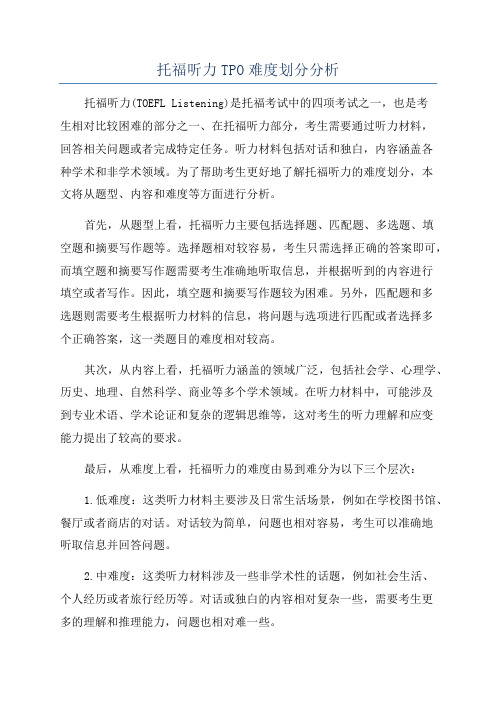
托福听力TPO难度划分分析托福听力(TOEFL Listening)是托福考试中的四项考试之一,也是考生相对比较困难的部分之一、在托福听力部分,考生需要通过听力材料,回答相关问题或者完成特定任务。
听力材料包括对话和独白,内容涵盖各种学术和非学术领域。
为了帮助考生更好地了解托福听力的难度划分,本文将从题型、内容和难度等方面进行分析。
首先,从题型上看,托福听力主要包括选择题、匹配题、多选题、填空题和摘要写作题等。
选择题相对较容易,考生只需选择正确的答案即可,而填空题和摘要写作题需要考生准确地听取信息,并根据听到的内容进行填空或者写作。
因此,填空题和摘要写作题较为困难。
另外,匹配题和多选题则需要考生根据听力材料的信息,将问题与选项进行匹配或者选择多个正确答案,这一类题目的难度相对较高。
其次,从内容上看,托福听力涵盖的领域广泛,包括社会学、心理学、历史、地理、自然科学、商业等多个学术领域。
在听力材料中,可能涉及到专业术语、学术论证和复杂的逻辑思维等,这对考生的听力理解和应变能力提出了较高的要求。
最后,从难度上看,托福听力的难度由易到难分为以下三个层次:1.低难度:这类听力材料主要涉及日常生活场景,例如在学校图书馆、餐厅或者商店的对话。
对话较为简单,问题也相对容易,考生可以准确地听取信息并回答问题。
2.中难度:这类听力材料涉及一些非学术性的话题,例如社会生活、个人经历或者旅行经历等。
对话或独白的内容相对复杂一些,需要考生更多的理解和推理能力,问题也相对难一些。
3.高难度:这类听力材料涉及学术性的话题,例如科学实验、历史事件、学术讲座等。
对话或独白的内容较为复杂,可能包含专业术语和复杂的逻辑推理,问题也更加困难。
这类听力材料对考生的听力理解能力和学科知识的掌握程度提出了更高的要求。
需要注意的是,托福考试的难度是相对的,不同考生对难度的感受也会有所不同。
但无论对于哪一类听力材料,考生都需要通过大量的练习来提高自己的听力能力,并逐步适应不同难度的听力材料。
托福听力高频话题分类总结回顾

托福听力高频话题分类总结回顾托福听力考试中涉及到的话题许多,而不同话题的消失频率也有较大差别,今日我给大家带来托福听力高频话题分类总结回顾,盼望能够关心到大家,下面我就和大家共享,来观赏一下吧。
托福听力高频话题分类总结回顾托福听力对话类话题总结2022年中托福听力部分对话converastion的话题,单从数量上来说并没有变化,哪怕是经过了考试改革,但对话本身的题数也没有发生调整。
而转变的可能主要还是话题的类型。
conversation对话部分始终以来主要涉及两大类话题:第一个是office hour,其次个是student service。
从难度上来说,很多同学觉得student service会比较简洁,由于说的都是大家在学校里生活可能会遇到的各种问题,相对来说更为贴近大家的日常,而office hour则可能会涉及到一些学术专业类的问题,有些同学本身对这个专业缺乏基本了解的话会觉得有些理解困难。
而从话题的消失频率来说,这两类话题基本上还是呈现五五开的局面,既每场考试中这两类话题在conversation中消失的频率次数照旧是基本相当的。
托福听力讲座类话题回顾相对于对话类没有太大的变化,讲座lecture的转变就比较多了。
首先是题目数量的削减,原本托福听力固定为两个section,各是1篇对话+2篇讲座的形式,考试改革后其中一个secion的讲座削减为一篇。
而除了直观的篇幅数量的削减外,讲座类的话题频率也发生了一些值得考生关注的变化。
虽然整体话题依旧以艺术类,社会科学类,自然科学类以及生命科学这四大类为主,但详细到细节话题,以下这些转变需要大家进一步关注:1. 艺术类话题艺术类话题中,考生需要留意的是绘画雕塑painting and sculpture 类的话题是近期较为高频的话题,而不巧的是许多国内考生,特殊是理科生,可能对这类话题是不太感冒的。
而相对来说大家可能更为熟识的文学音乐类话题,消失频率则有小幅的下降,但依旧应当作为大家备考的重点分类。
【托福写作】综合写作题型分类
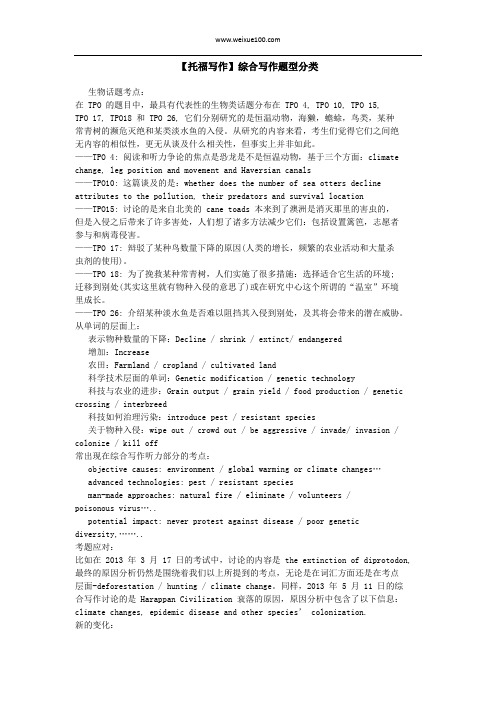
【托福写作】综合写作题型分类生物话题考点:在 TPO 的题目中,最具有代表性的生物类话题分布在 TPO 4, TPO 10, TPO 15,TPO 17, TPO18 和 TPO 26, 它们分别研究的是恒温动物,海獭,蟾蜍,鸟类,某种常青树的濒危灭绝和某类淡水鱼的入侵。
从研究的内容来看,考生们觉得它们之间绝无内容的相似性,更无从谈及什么相关性,但事实上并非如此。
——TPO 4: 阅读和听力争论的焦点是恐龙是不是恒温动物,基于三个方面:climate change, leg position and movement and Haversian canals——TPO10: 这篇谈及的是:whether does the number of sea otters decline attributes to the pollution, their predators and survival location——TPO15: 讨论的是来自北美的 cane toads 本来到了澳洲是消灭那里的害虫的,但是入侵之后带来了许多害处,人们想了诸多方法减少它们:包括设置篱笆,志愿者参与和病毒侵害。
——TPO 17: 辩驳了某种鸟数量下降的原因(人类的增长,频繁的农业活动和大量杀虫剂的使用)。
——TPO 18: 为了挽救某种常青树,人们实施了很多措施:选择适合它生活的环境;迁移到别处(其实这里就有物种入侵的意思了)或在研究中心这个所谓的“温室”环境里成长。
——TPO 26: 介绍某种淡水鱼是否难以阻挡其入侵到别处,及其将会带来的潜在威胁。
从单词的层面上:表示物种数量的下降:Decline / shrink / extinct/ endangered增加:Increase农田:Farmland / cropland / cultivated land科学技术层面的单词:Genetic modification / genetic technology科技与农业的进步:Grain output / grain yield / food production / genetic crossing / interbreed科技如何治理污染:introduce pest / resistant species关于物种入侵:wipe out / crowd out / be aggressive / invade/ invasion / colonize / kill off常出现在综合写作听力部分的考点:objective causes: environment / global warming or climate changes…advanced technologies: pest / resistant speciesman-made approaches: natural fire / eliminate / volunteers /poisonous virus…..potential impact: never protest against disease / poor genetic diversity,……..考题应对:比如在 2013 年 3 月 17 日的考试中,讨论的内容是 the extinction of diprotodon, 最终的原因分析仍然是围绕着我们以上所提到的考点,无论是在词汇方面还是在考点层面-deforestation / hunting / climate change。
托福TPO话题分类

托福TPO分类听力练习对话1 学生与图书馆管理员:TPO13C2 / TPO9C2/TPO1C1 / TPO14C1/TPO4C1 / TPO10C22 学生与老师谈论文:TPO6C2 /TPO12C1 / TPO13C1 /TPO22C2 / TPO17C1谈problem:TPO21C2/ TPO23C2/TPO16C2 /TPO10C1 /TPO4C2生物1, 动物行为:/ Tpo3l1 habitat/ Tpo8l1 habitat selection / Tpo16l3 foraging2, 动物的超能力:Tpo20l4 躲避天敌/ Tpo18l4冬眠/ Tpo9l4 linguistics 动物语言/ Tpo23L3 dolphin发声法/ Tpo24l1 crocodile vocalization3, 珍稀动植物:TPO6l2 澳洲珍稀物种4, 动植物进化史:Tpo21l3 毒蛇/ Tpo24l3 megafauna (mammoth)5, 动植物与环境的互动:Tpo13l2 海狸/ Tpo22l3 人类活动的影响6, 生理:Tpo12l1 染色体艺术史1, 艺术形式:Tpo12l3 opera/ Tpo16l2 piano/ Tpo18l2 sculpture/ Tpo23l4 choreography2, 技术手段:Tpo15l3 莎草纸/ Tpo16l4 着色玻璃/ TPO17L1 radio-carbon dating3, 艺术史上的知名人物:Tpo1l1 当代绘画艺术家/ Tpo24l2 modern dance: a ballerina4, 文学1),文学形式:Tpo20l3 folktale2),文学人物3),其它:Tpo6l3 writing天文1,天体形成的过程/天体物质2,天文观测手段:Tpo3l4 spectroscopy3,对某些现象的假想:Tpo24l4 shield volcano on Venus4,知名天文现象:Tpo18l1 太阳黑子5,人类对天文知识的应用:Tpo14l3 navigation地质1,一些地质现象形成的原因:TPO16L1 Lechuguilla2,地质勘探手段:Tpo1l2 uranium-lead dating technique3,一些知名的地质现象:Tpo20l2 ice age4,环境科学:Tpo11l3 wetlands/ Tpo17l2 地球绕太阳影响气候/ Tpo23l2反照率。
- 1、下载文档前请自行甄别文档内容的完整性,平台不提供额外的编辑、内容补充、找答案等附加服务。
- 2、"仅部分预览"的文档,不可在线预览部分如存在完整性等问题,可反馈申请退款(可完整预览的文档不适用该条件!)。
- 3、如文档侵犯您的权益,请联系客服反馈,我们会尽快为您处理(人工客服工作时间:9:00-18:30)。
TPO听力1-33话题分类
绝大部分的托福听力段子都是依托场景而存在的,比如说校园、图书馆、书店、报刊亭、电影院、剧院等。
一些关于杂志的听力段子也重复出现。
如果考生能够提前分门别类的练习在不同场景、不同学科领域的段子,反复去听去熟悉,对付这类题型相对就容易很多。
听力练习过程中需要对各个学科话题熟悉,于是有必要进行“横听”,即把相似话题的材料一起听。
以下是我总结的一份TPO 1-31的听力学科表便于国际部的同学们进行归纳性学习。
Lecture 1 Lecture 2 Lecture 3 Lecture 4
TPO 1 Contemporary Art Geology Archeology Biology
TPO 2 Philosophy Psychology Astronomy Botany
TPO 3 Environmental Science Film History Art History Astronomy
TPO 4 Biology Literature Geology United States government
TPO 5 Sociology Astronomy Chemistry Literature
TPO 6 Economics Biology Creative Writing Earth Science
TPO 7 Theater History Biology Anthropology Geology
TPO 8 Animal Behavior Art History History Chemistry
TPO 9 Theater Environmental Science Geology Linguistic
TPO 10 Marine Biology European History Ecology Psychology
TPO 11 Biology Architecture Environmental Science Business
TPO 12 Biology Business Music History Environmental Science TPO 13 City Planning Ecology Poetry Astronomy
TPO 14 Psychology Biology Astronomy Archeology
TPO 15 Psychology Geology Art History Biology
TPO 16 Geology Music History Biology Art History
TPO 17 Art History Environmental Science History Biology
TPO 18 Astronomy Art History European History Biology
TPO 19 Linguistic Astronomy Marine Biology Art History
TPO 21 Astronomy Computer Science Biology Art History
以下是TPO听力部分每篇lecture的学科分类表,更加直观一点。
在冲刺阶段做题时,如某部分错误
率较大,可针对性的强化该学科的单词,然后集中做一下这个学科的真题。
